Did you know that 4 out of 10 Greeks believe that tax evasion is a "legitimate defense against excessive taxation"? That half of all Greeks believe that "you become Greek" (rather than being "born Greek")? That 7 out of 10 believe that the children of legal immigrants should immediately be granted Greek citizenship? Could you imagine that 1 in 4 Greeks believe in the so-called "chemtrails" theory (that airplanes are spraying us with chemical or biological agents)?
The first survey ever published by diaNEOsis was a large national poll that aimed to "x-ray" Greeks’ opinions on a series of important issues. Before beginning to suggest solutions for the most significant economic and social problems facing the country, we wanted to explore what people believe, how they think, how they cope with the crisis and our world in general. In April and November 2015, we recorded their perceptions of Europe, and Greece’s place in it, on issues of the economy and the market, on human rights and institutions, on immigration, education, and their way of life. And we did the same again this year.
The key findings can be summarized as follows:
- Anti-Europeanism is on the rise, but hasn’t yet reached a majority.
- Institutions are in crisis, but Greeks do not yet question democracy as a political system.
- Greeks consider themselves economic liberals, at unexpectedly high levels, as well as anti-statist.
- Greeks are conservative on most social issues.
These conclusions are drawn from the respondents’ answers to 73 questions with more than 200 variables. The survey was conducted by telephone, in collaboration with the Public Opinion Research Unit of the University of Macedonia, Thessaloniki, in December 2016, and was divided into two parts: Part A on a nationwide sample of 1,294 people, and Part B on a nationwide sample of 1,263 people. Seven of the questions were repeated in both samples, so comparisons could be made across the whole questionnaire.
Download the report on the survey’s results (in Greek)
As always, you can examine the full results more closely in a detailed report (PDF in Greek) that includes tables with the responses of 11 subsets of the population (based on gender, occupation, education, political leanings, etc.). In addition, researchers can examine the data to draw any correlation they may consider relevant. The data contains a wealth of potential conclusions, only some of which we will mention here.
You can also read an extensive analysis (PDF in Greek) of the results by University of Macedonia Professor Nikos Marantzidis here, while numerous articles with analyses and comments on specific issues arising from the data will be uploaded here in the coming weeks and months. Maria Efthimiou, a professor of History in University of Athens and the author Nikos Dimou have also written articles that try to analyze researches key-findings.
Here we will briefly examine some of the most significant results.
Rising Anti-Europeanism
The conclusion that arose from last year’s survey – that there is mild skepticism of the European Union, but not yet an open schism, appears to apply this year as well. Only this year that skepticism is less mild, disappointment more intense, and the voices calling for rejection of the EU are louder. Indeed, looking at the results of diaNEOsis’ three surveys for nearly all the "European" questions, the trend is obvious.
Download Nikos Marantizidis’ Report (PDF)
"In international terms, we would say that we’re seeing the emergence of an intense and potentially-threatening euroskepticism, which challenges Greece’s place in the European Union" writes Nikos Marantzidis in his analysis of the results.
In the very first question of the survey, those who say they consider Greece’s participation in the EU "positive" and "probably positive" reach 53.5% of the overall population today, from 59.9% in November 2015 and 69% in April 2015. The segments of the population where the majority were "negative" or "probably negative" were the less educated, those with very low income, farmers, the unemployed, the self-employed (in technical professions), those who self-identify as ‘lower class’ and those who self-identify politically as "far left," "left" and "far right."
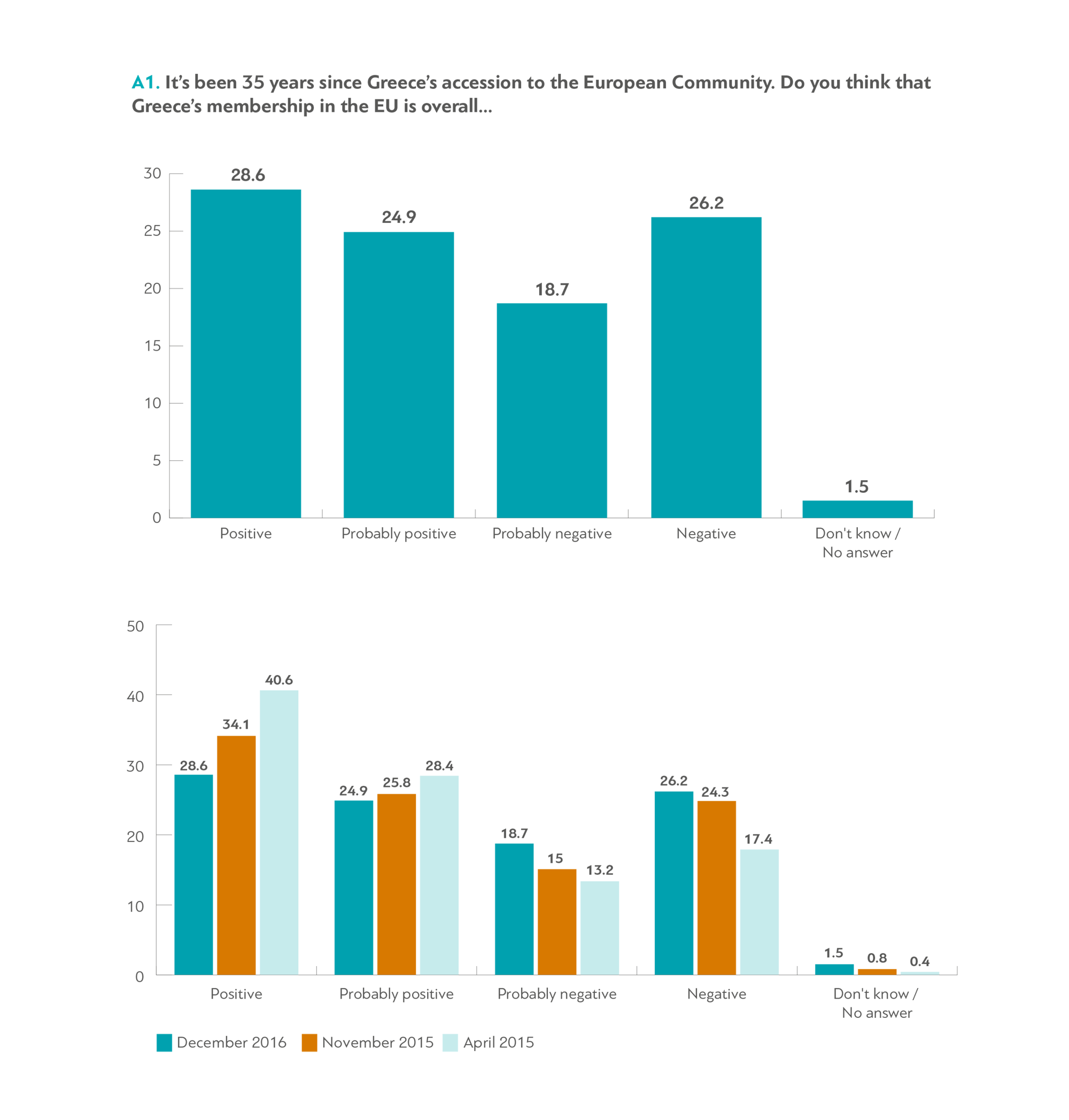
It is interesting that part of the population’s rejection of the EU does not seem to stem only from the current economic crisis. 1 in 4 Greeks perceives Greece’s participation in the EU as "negative" or "probably negative", but also believes that the crisis is due "mainly to our own weaknesses".
In his analysis of last year’s results, Professor Gerasimos Moschonas identified three distinct groups based on responses towards Europe: the "pro-EU camp," the "hard-core Europhiles" and the "hard-core Εurosceptics," which responded very differently to nearly all the questions in the survey, and they defined attitudes towards Europe as the new, main distinguishing feature of Greeks’ perceptions.
This year, this distinction seems to remain, although that which Moschonas called "realistic pro-Europeanism" is considerably more "realistic". Examining the group characterized as the "pro-EU camp," one can identify some changes. First of all, it has clearly gotten smaller. In April 2015, those who saw Greece’s participation in the EU positively (these were the ‘pro-EU camp’) amounted to 40.6% of the population. This year, it is 28.6%. Secondly, their positions on European issues are slightly less enthusiastic (see the .xls with all their responses in Greek). For example, in April 2015 66% of respondents in this group agreed that Greece has benefited from its membership in the EU, in terms of economic growth and prosperity. This year, that figure is 55%.
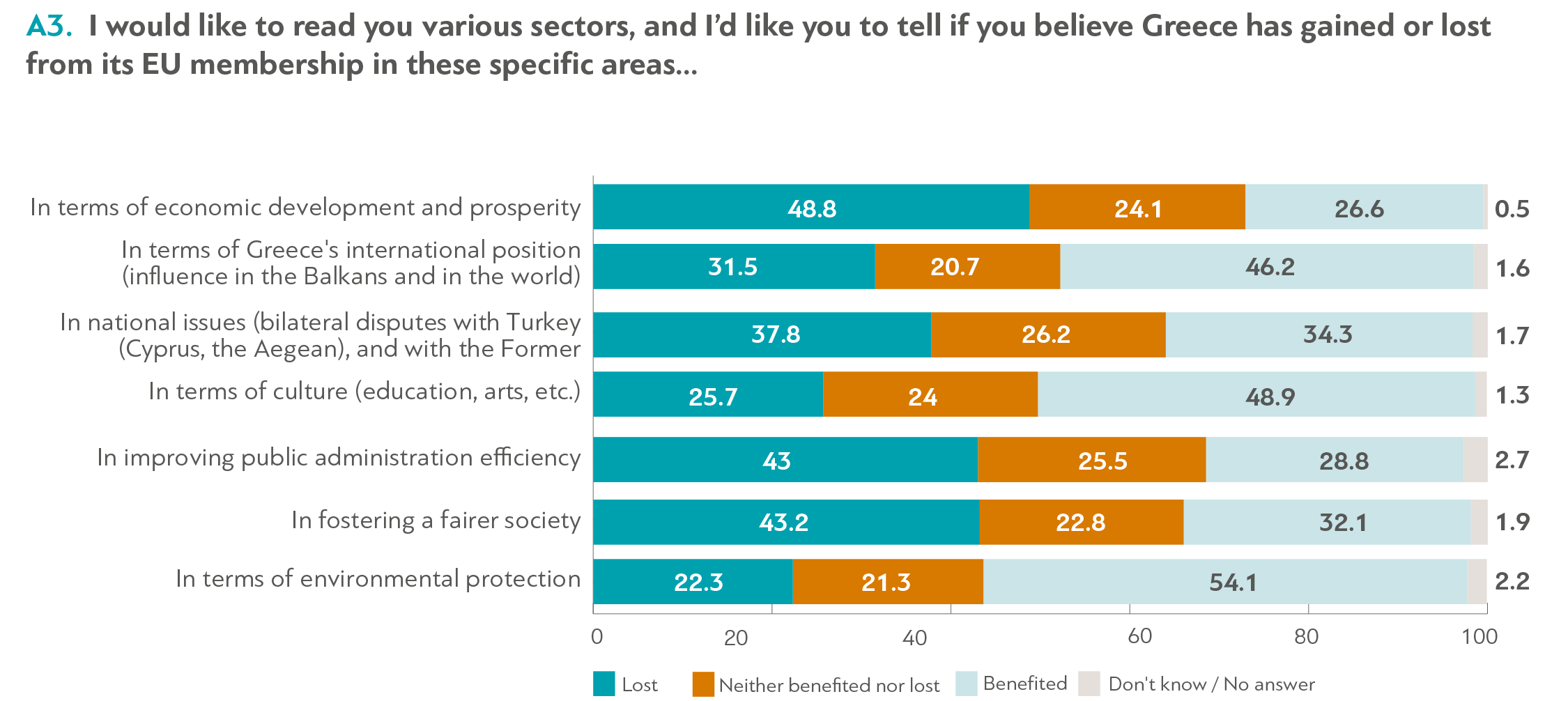
In a broader context, the overall picture of Greeks’ perceptions of Europe remains mixed. Greeks continue to believe that EU membership has been detrimental to the country in all the areas we asked about except its "international status," "culture" and "environmental protection." Around 6 in 10 Greeks believe that the EU has benefited from Greece’s membership more than Greece itself. This position is held by 7 in 10 with an elementary school-level education, and 8 in 10 farmers, which is quite interesting considering the amount of EU subsidies that have entered the country in recent decades.
This pattern is more or less repeated with all "European" questions. The poor, the less educated and especially those who identify themselves with the extremes of the political system reject the EU the most. On the other hand, the more prosperous, educated and politically centrist the respondents, the more they want the country to be part of the EU.
The overall picture that emerges is one of ambivalence, and cautious acceptance that still seems apprehensive. "It can be said," writes Marantizidis, "that for many Greeks, EU membership is detrimental, or in the best case scenario, a minor luxury".
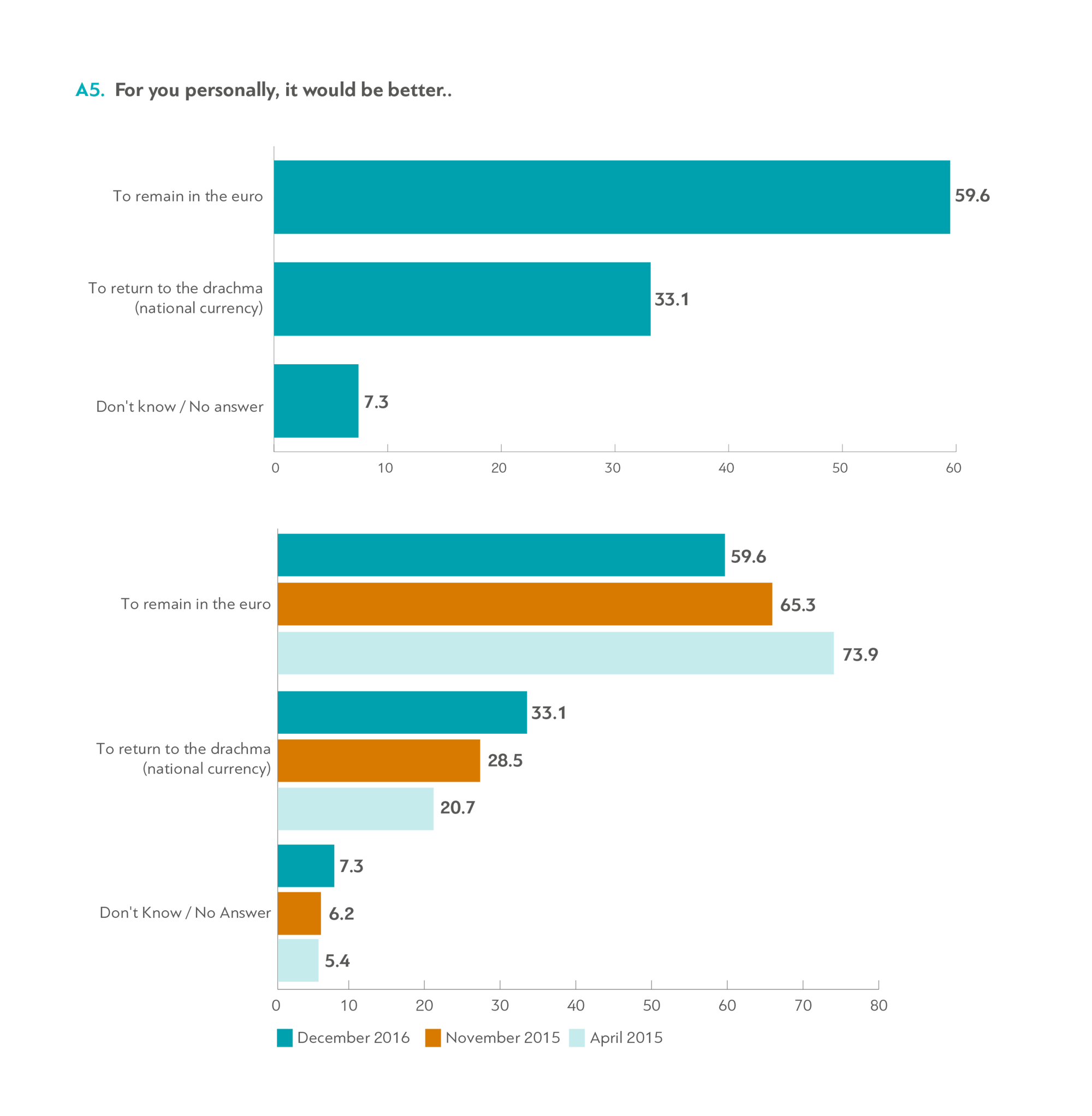
The question of Greece’s participation in the Eurozone is of course a critical one. The percentage that wishes to remain in the Euro has now fallen to 59.6% (from 73.9% in April 2015), while the percentage of those who wish to return to a national currency has risen to 33.1% (from 20.7% in April 2015). Those who want to keep the common currency are a majority in all the age, income and educational categories that we have studied, in all occupations, and in all regions of Greece.
The majority leaning in favor of the drachma currently appears only in a few specific political and ideological categories. The trend, however, is clearly visible. As Marantzidis writes, "the picture in favor of the euro and Greece’s place in the European Union, that has been shaped by Greek society, must not be taken for granted. It could be transformed in the future if the economy continues to deteriorate and Greeks lose their prospects for the future".
And it seems that Greeks do not have very rosy expectations for their future and for their country’s place in Europe. Most believe that Greece’s convergence with other EU countries is not possible (76.6% from 66.1% in April 2015), while the percentage of Greeks who believe that Greece is "a modern country, not very different from other European countries", has fallen to 58.3% from 71.5% in April 2015. This pessimism extends to all matters relating to the future. In addition, 6 in 10 Greeks believe that 10 years from now our country will not have emerged from economic crisis. 6 in 10 also believe that capital controls will remain, while 4 in 10 believe that Greece will have left the euro. 4 in 10 believe that the country will have left the European Union.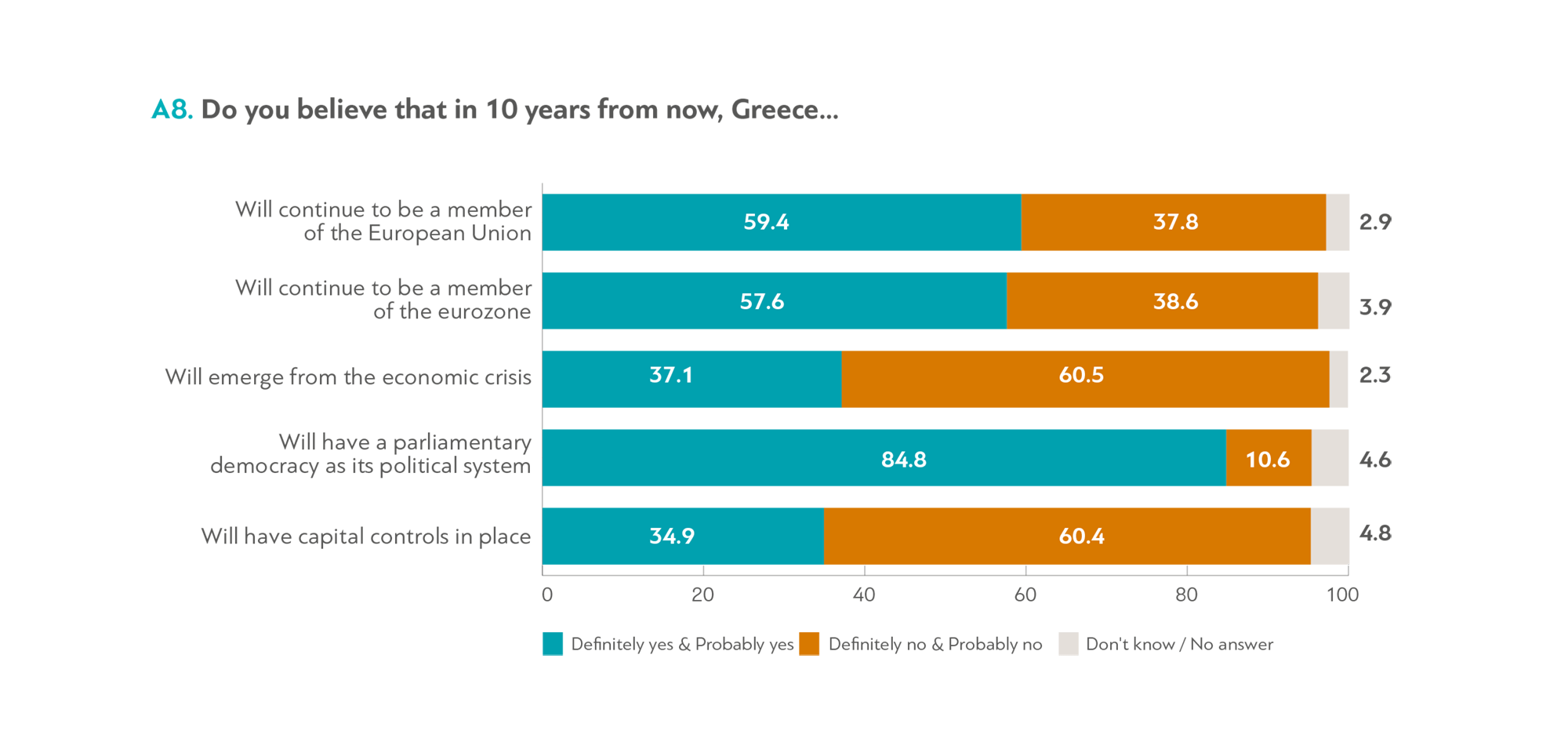
Half of Greeks also believe that within the coming years the European Union will split, with some countries withdrawing, while another 3 in 10 believe it will dissolve completely. Only 1 in 10 believe that it will become a more powerful confederation of states.
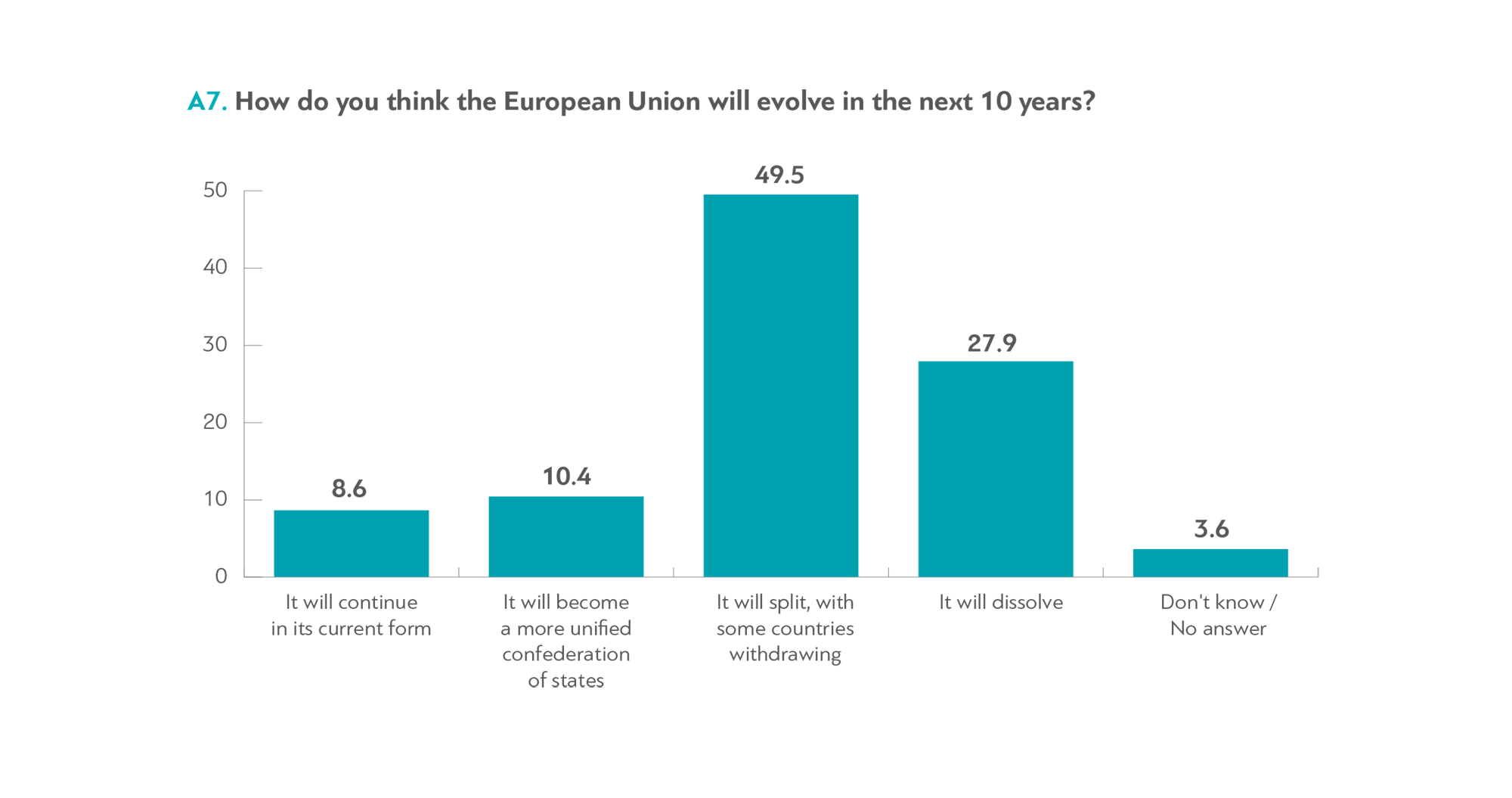
Incidentally, it is worth nothing that 8% of the respondents believe that in the next 10 years the European Union will dissolve, but also that 10 years from now Greece will continue to be a member of it. This certainly raises fair questions, and contributes to a conclusion we will discuss towards the end of this analysis.
Democracy and Institutions
One of the most spectacular findings of last year’s survey was the repeated confirmation of the extremely high regard Greeks have for themselves and their country. This picture remains clear. 9 in 10 Greeks say they are "proud to be Greek" while they continue to believe that "the Greeks are a nation with a long history that, despite the current crisis, still stands out for its genius and its culture" at 62.3% (a percentage which, however, was 10 points higher in April 2015). The only segments of the population that disagree are the richest (48.3%) and the far left (28%).
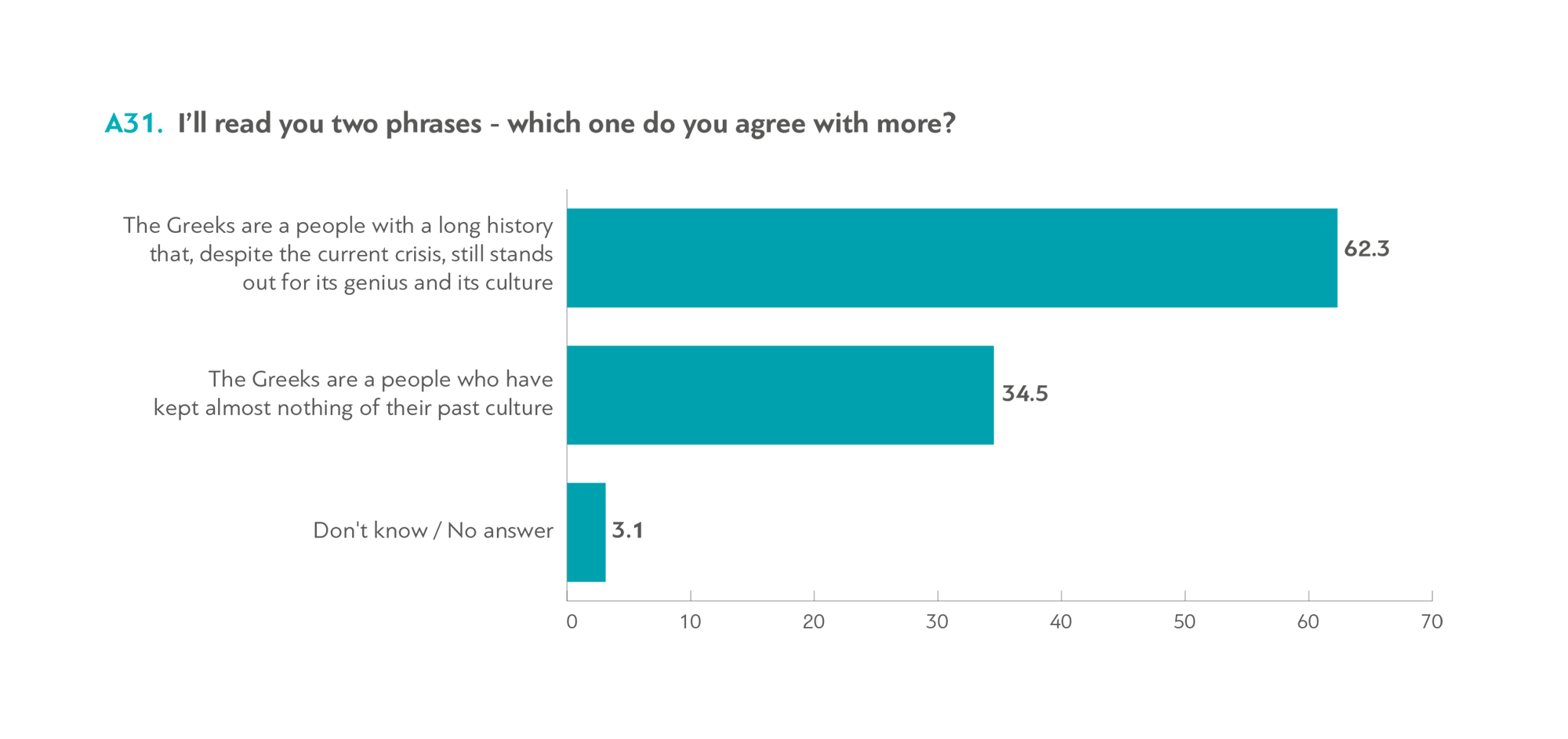
Of course, like last year, Greeks believe that the crisis is due "mainly to our own weaknesses" (62.1%). 76% believe that "we who grew accustomed to borrowing in order to consume more than we produce" are at fault, and nearly all (93.6%) believe that "the incompetence and corruption of the Greek government" is to blame. One could argue that today, after several years of crisis, Greek society demonstrates a high degree of collective self-knowledge", writes Marantzidis. "Even though it’s not clear how exactly responsibility is divided between domestic political figures, interest groups, and Greek citizens, it is clear that the causes of the country’s poor economic situation are mainly due to domestic causes rather than foreign forces".
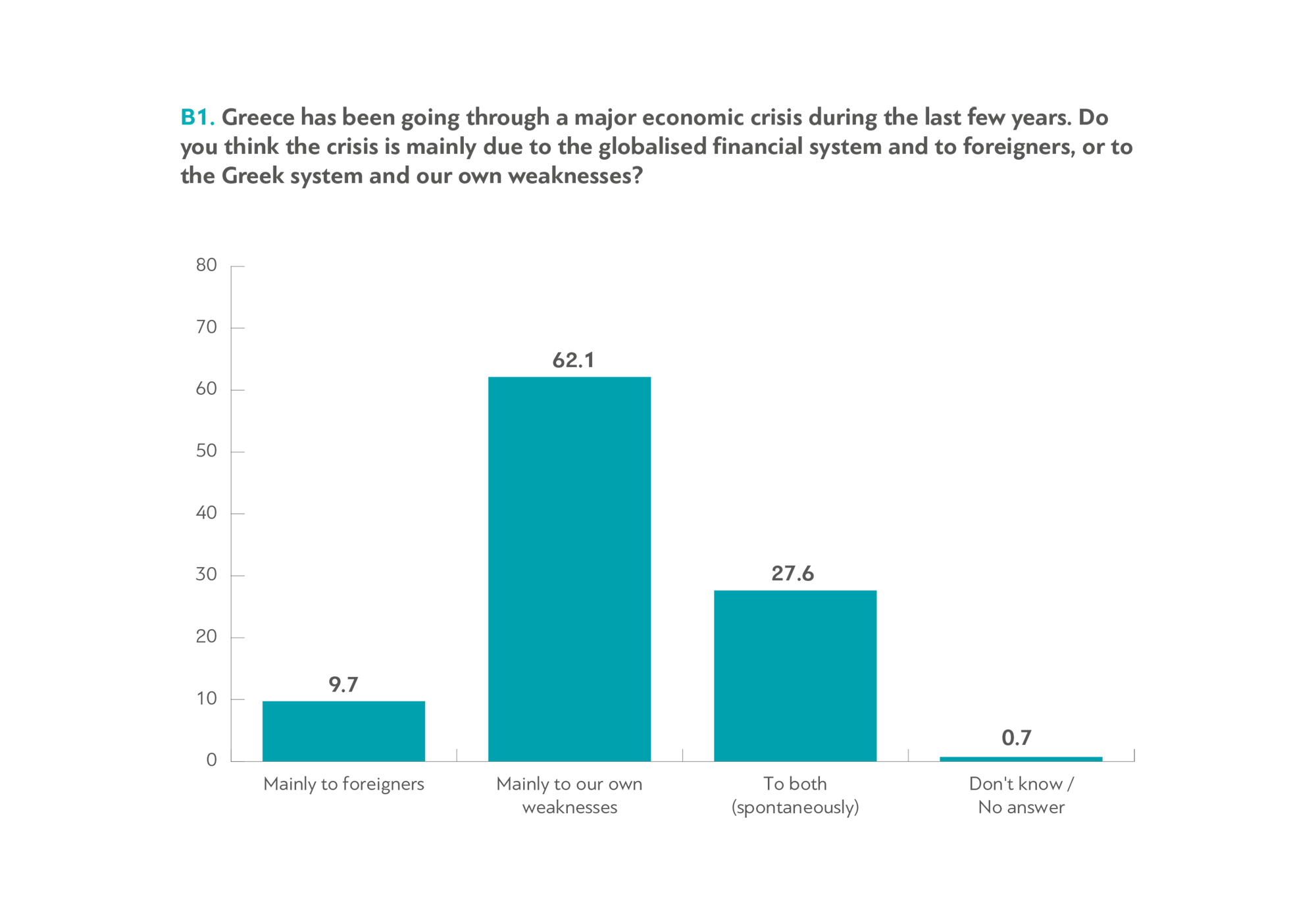
One of the most widely shared and discussed results from last year’s survey was the "Russophilia" phenomenon. To the question on whether Greece’s interests would be better secured through alliance with another country, the impressive 30% that chose Putin’s Russia in April 2015 raised discussion, especially since the same percentage among young people ages 18-24 was the majority response. It was thought that this result was due to the timing and the whole conversation around Russia’s involvement in the notorious "negotiations", which seemed to be confirmed when in November 2015 this figure fell sharply. This year, one would expect a further reduction in the number of Greeks who would like an alliance with Russia, but the data does not show this. Instead, today one in three would prefer that we ally with Russia rather than continue to participate in the Eurozone.
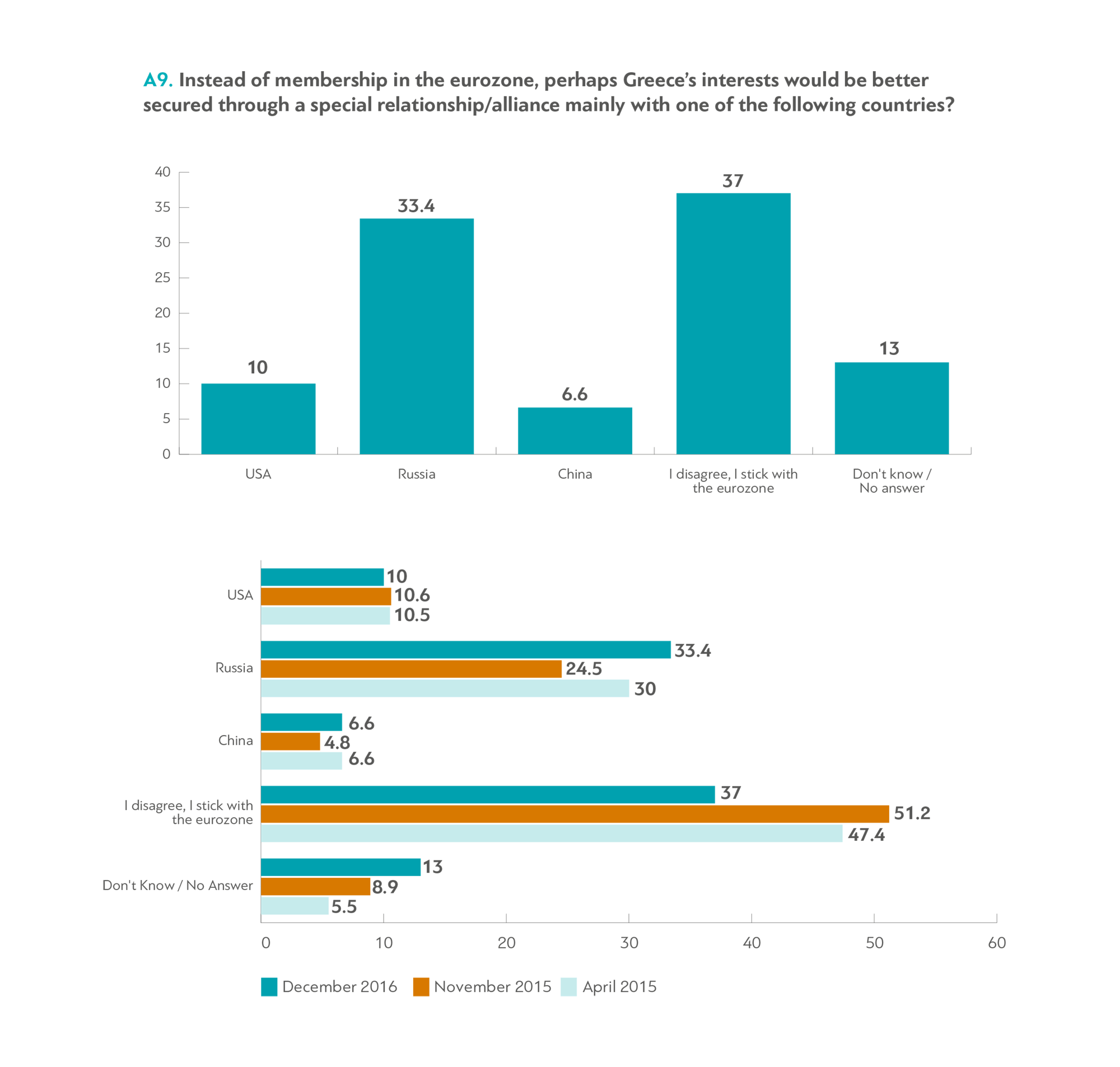
Half of farmers and half of the "far right" believe the same thing. It is, however, remarkable that the percentage of young people ages 17-24 that agree is around the same as that of the general population. Moreover, nearly 8 in 10 Greeks believe the word "Russians" is something positive (in contrast to "Turks" 28%, "Germans" 36.4% and "Muslims" 36.3%).
Of course, the responses to the question "which country do you think provides the best model of governance" raise fair questions. Only 1 in 10 choose Russia in that framework, while, with a large margin from other governance models, 6 in 10 Greeks say they prefer the Swedish model.
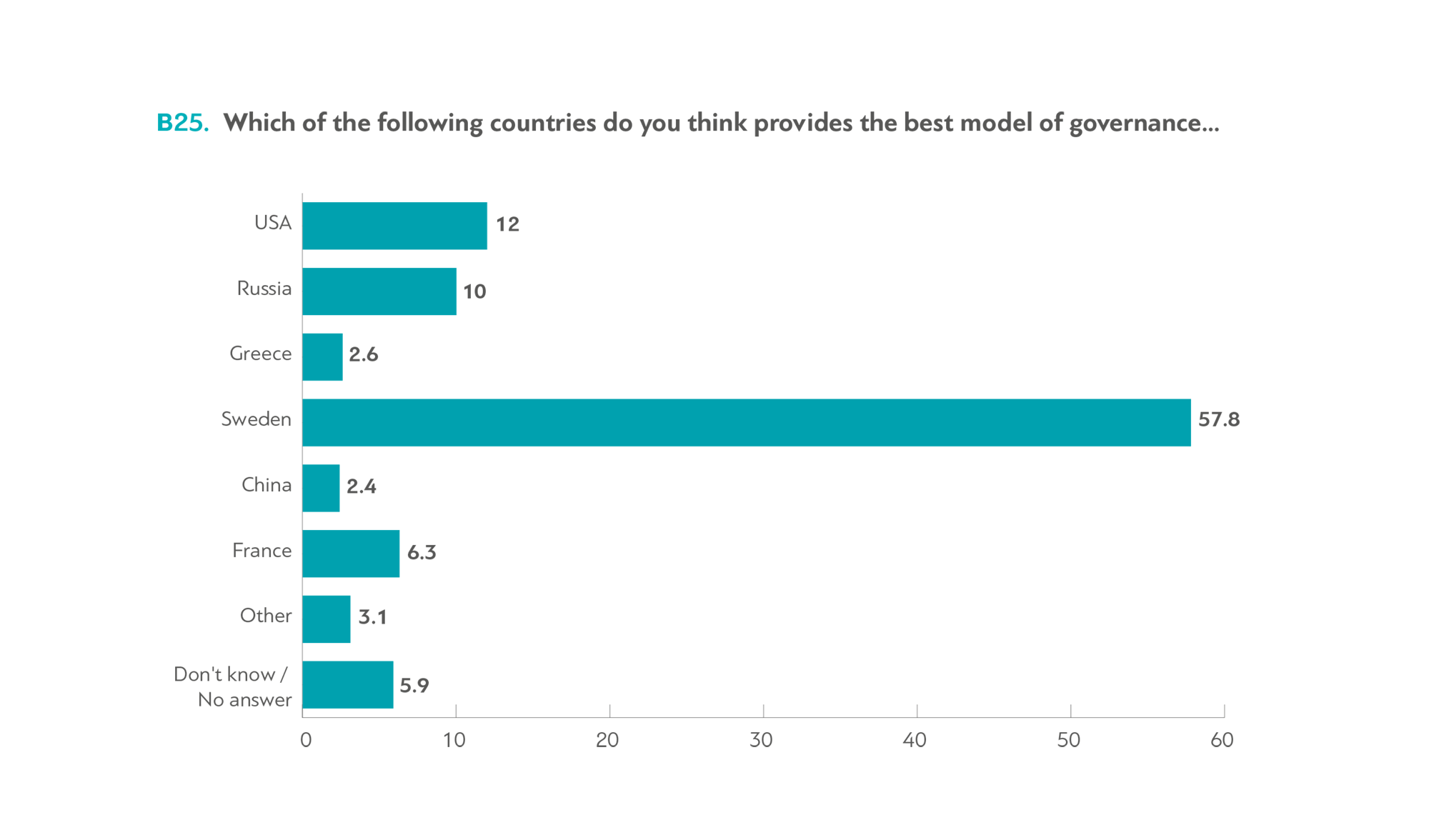
Greeks continue to have confidence in the democratic system – 9 in 10 responded "I agree" or "I probably agree" with the classic question of whether democracy "despite its problems, is the best system of government". But there is a clear decline in the perception of how democratic institutions are functioning in our country. Only 55.4% believe that they "enjoy all the freedoms that characterize a democracy" (from 65.1% in April ’15), just 35.2% that they "live in a safe environment" (from 44.5%), and only 27% think that the judicial system "treats all citizens as equal". "Greeks believe that democracy is the best form of government", writes Marantzidis, "but in Greece democracy is so 'diseased' in certain areas that it is doubtful whether it is really a 'normal democracy' ".
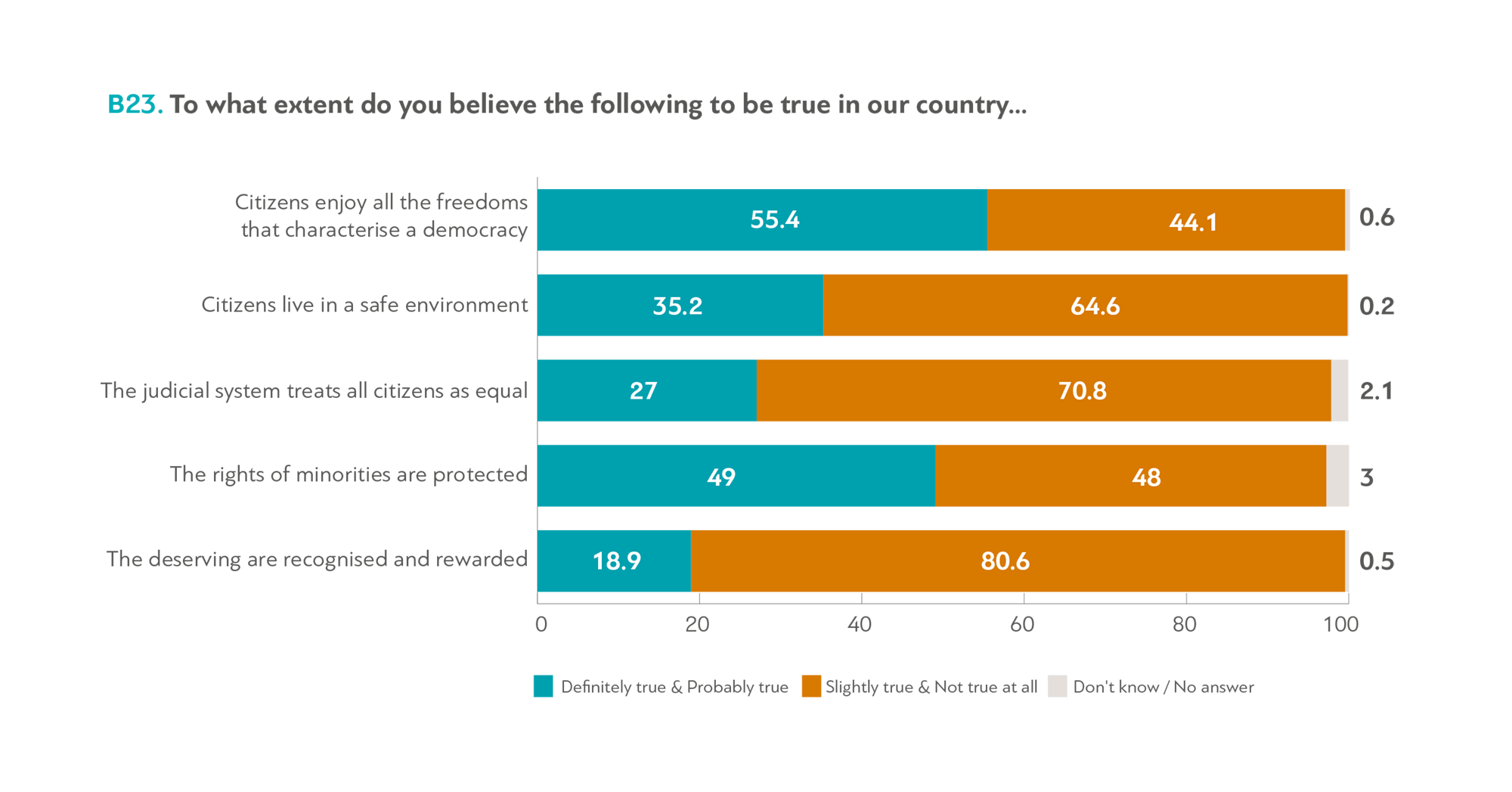
Public confidence in institutions remains extremely low, with the only exceptions the armed forces (81.3%), the police (72.2%) and, of course, the always-dominant family (97.2%). "Our fixation on the family," writes historian Maria Efthimiou in her note, "the fount of warmth and security it provides, is certainly associated with the fact that, through it, we nestle into our tight cocoon and don’t care about our society as a whole". The drop in trust in institutions, such as the prime minister (44.2% from 71.2% in April 2015) and the government (39.3% from 62.5%) is remarkable, and can be explained by political developments.
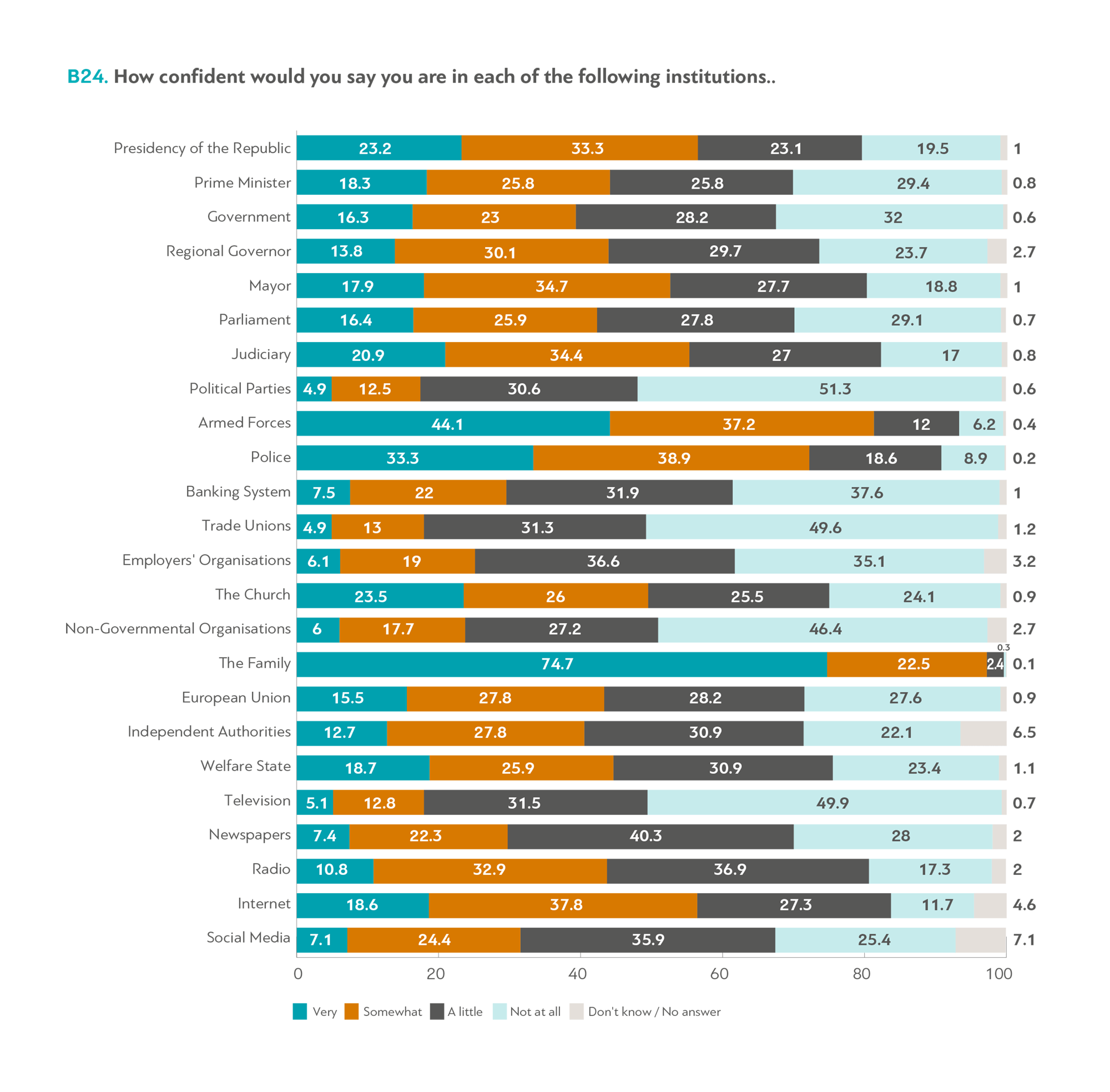
Most Greeks self-identify at the "center" of the political spectrum (24.1%), while most call themselves "Social Democrats" (19.7%) or "Liberals" (17.9%), with other ideologies well-distributed. In this question, it is interesting to explore the ideological characterizations voters of different parties attribute to themselves, such as the 29.1% of SYRIZA voters who call themselves "Social Democrats" (the highest percentage among the ruling party’s voters), 14.4% of SYRIZA voters call themselves "liberals" (the third largest proportion), while just 46.5% of KKE voters consider themselves "Communist" and 11.1% of ANEL voters call themselves "socialists."
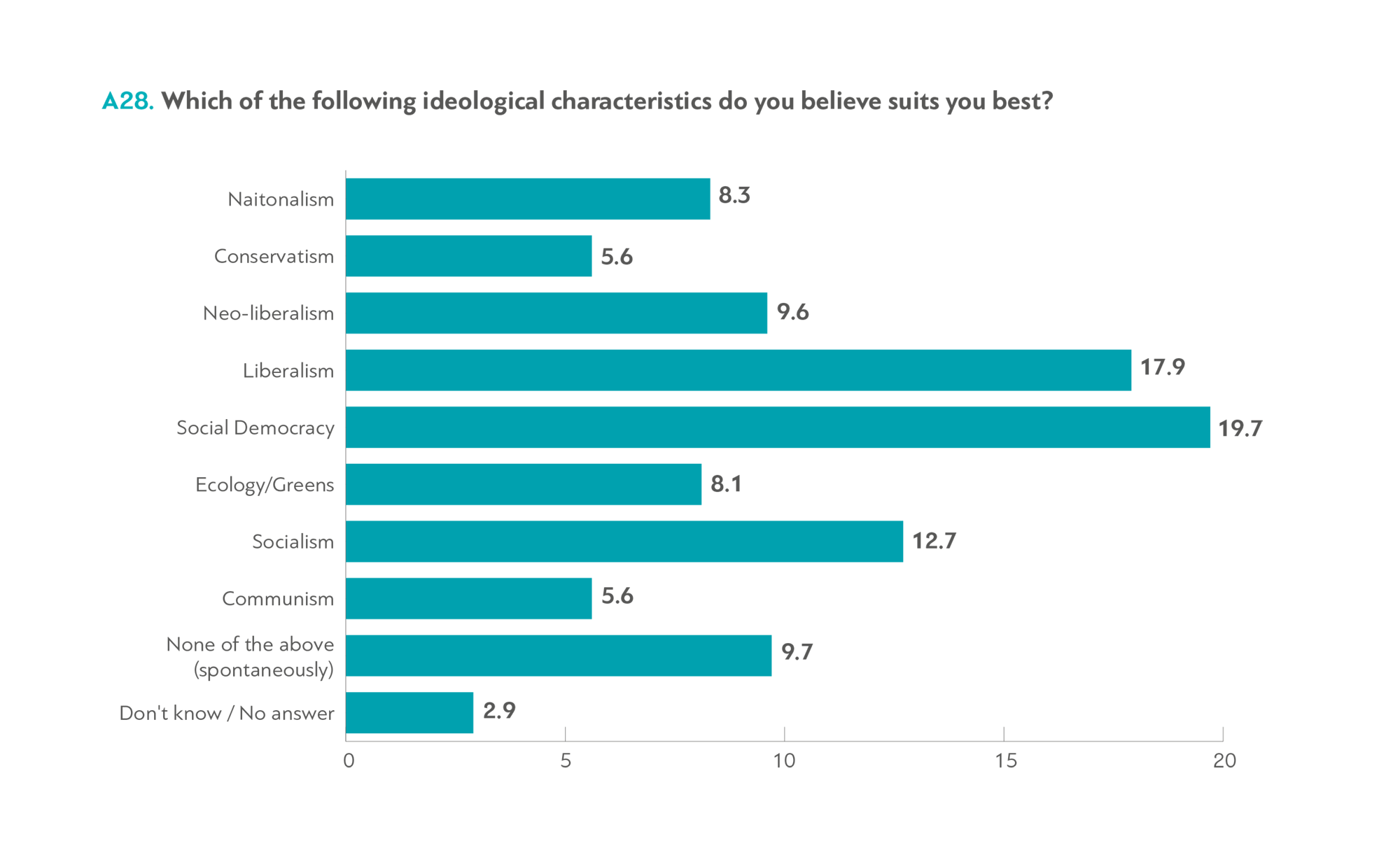
However, the vocabulary of the "left" continues to dominate our country’s political dialogue. Only 33.3% of citizens consider "capitalism" to be "positive" (a percentage that has increased by about 10 points from April ’15, of course), but 62.1% think "socialism" is a good thing. This shows an interesting contradiction: Greeks have a clear opinion on the basic question that distinguishes socialism from liberalism: 64.8% believe that ‘freedom’ is more important than "equality" – a question that practically defines liberalism. This was a majority response in all population segments with just one exception (those with an elementary school education). It is interesting that SYRIZA voters prefer "freedom" to "equality" at a rate almost identical to the general population.
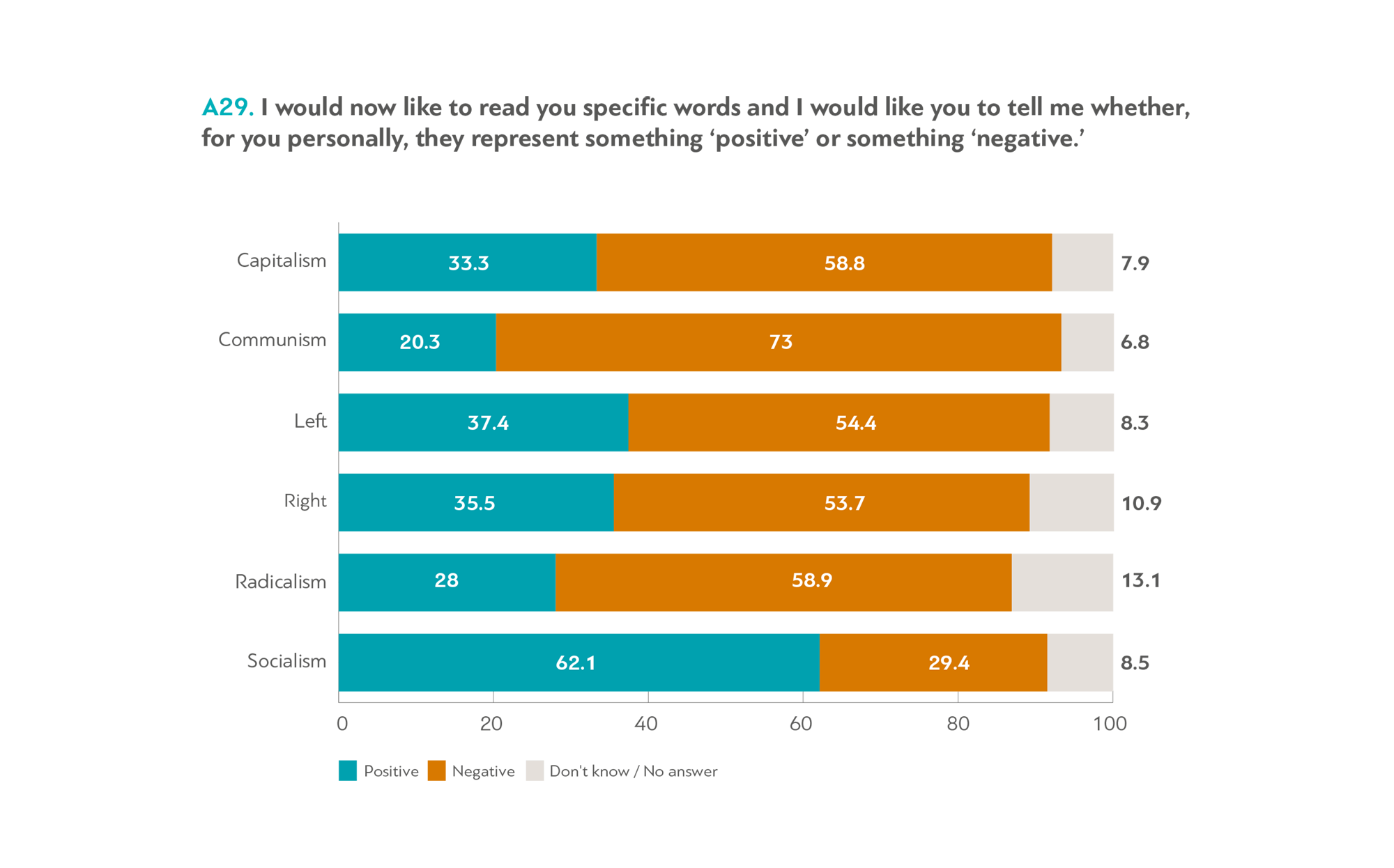
The most indicative conclusion related to Greeks’ political behavior and how they deal with institutions and politics in general might emerge from one question that, in such an extensive questionnaire, could go unnoticed. We asked the respondents to tell us if they think the word "compromise" is something good or bad. 45.1% of Greeks – almost half – believe that compromise is something bad. This may suffice to explain the series of phenomena that plague our political culture.
Anti-statists and liberals?
The conclusion of last year’s survey, that Greeks identify themselves as economically "liberal" much more than one would imagine, is evident this year as well, and indeed even more strongly, for reasons that are easy to interpret. In addition, 6 out of 10 Greeks believe that "we need a smaller public sector", while the same percentage believe that "the state intervenes too much, and does not allow that private sector to produce general wealth and jobs". It is very interesting that no sector of the population, in terms of ideological, profession or income bracket, chose the alternative answer ("the state does not intervene enough and allows the private sector to act with impunity") in higher proportions.
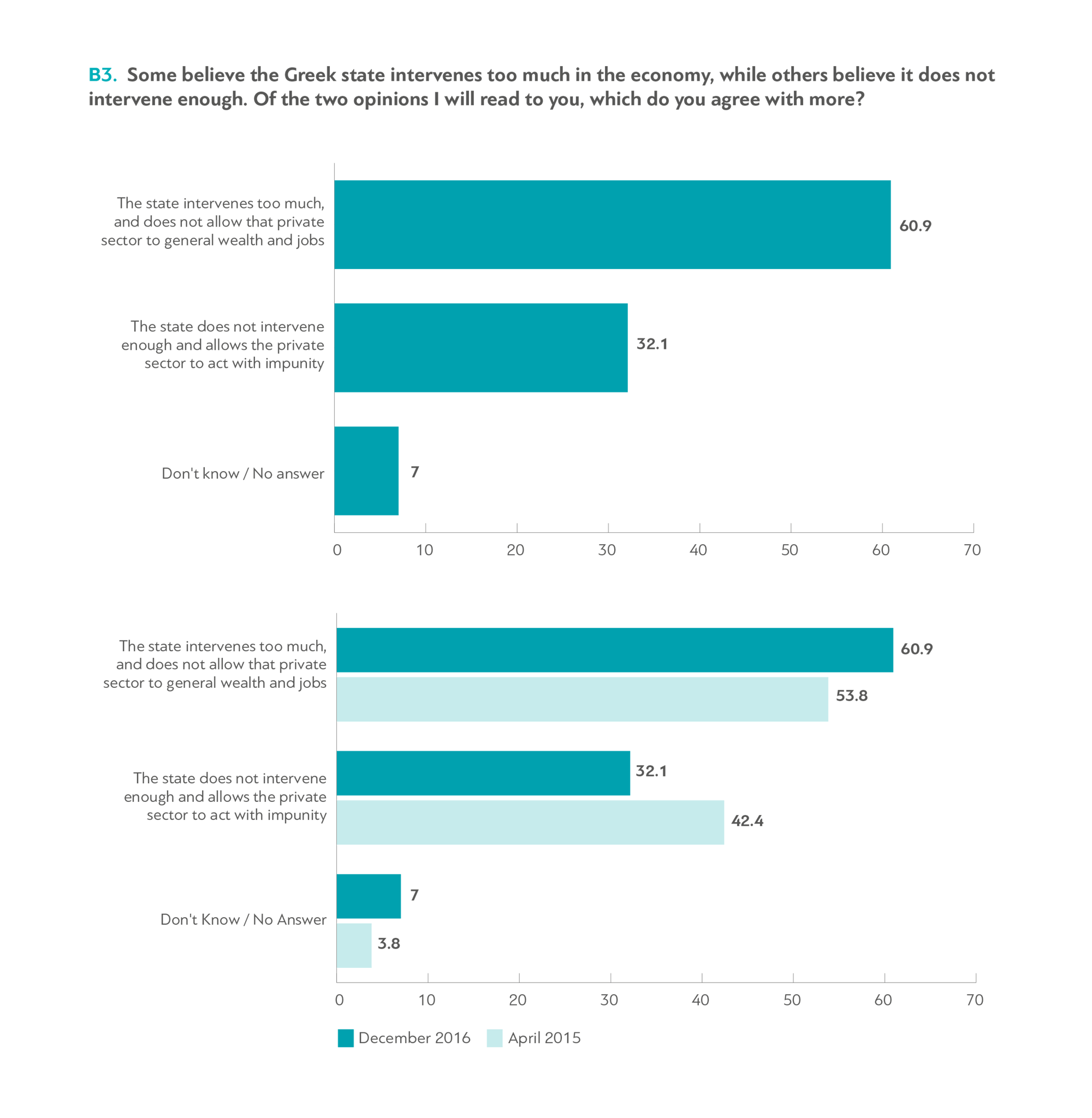
The conclusion on taxation is even clearer, as it emerges as an issue extremely important for the Greek public – perhaps the most important political and economic issue today. Asked what reforms they believe should be an immediate priority, 4 in 10 choose "change the tax system", with a large gap from the other options of education, the justice system or public administration. Today those who believe that "there must be high taxes and a robust welfare state for all" is at 31.9%, from 49.7% in April 2015, while those who believe that "taxes should be low even if there is less state coverage" reached 54.5% (from 39.2% in April 2015). It is obvious that the increase in taxation over the last two years had led to this quite dramatic shift in citizens’ opinions on their financial relationship with the state.
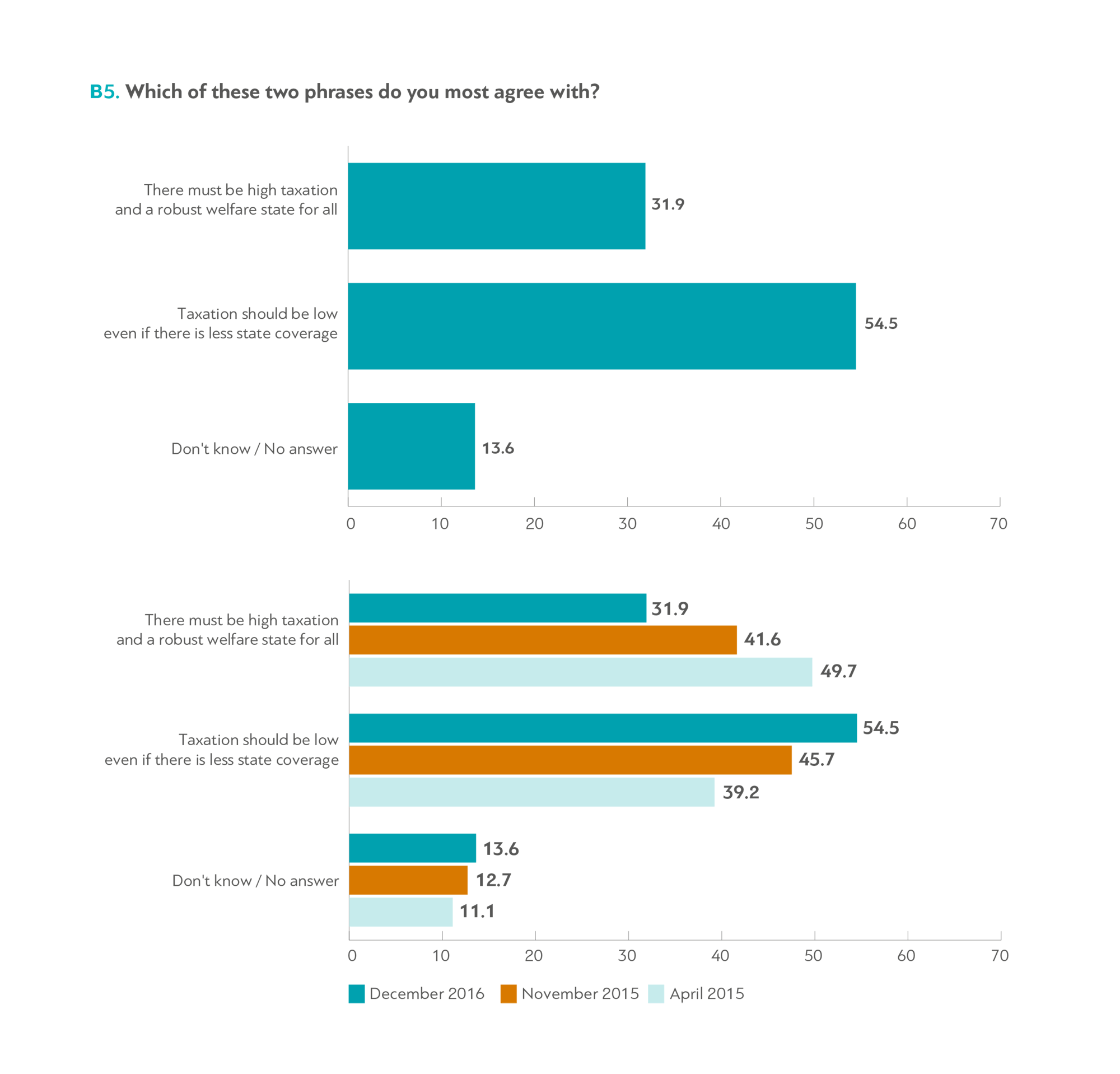
Now just 4 in 10 Greeks believe that taxation of real estate is right (from 56.7% in April 2015), most believe that tax evasion can’t be stamped out (71.1%) while 1 in 3 Greeks still report that "since so many evade taxes, when it’s possible I do too," and 4 in 10 characterized tax evasion as a "legitimate defense against excessive taxation". 84.9% believe that lower taxes will help bring foreign investment to Greece.
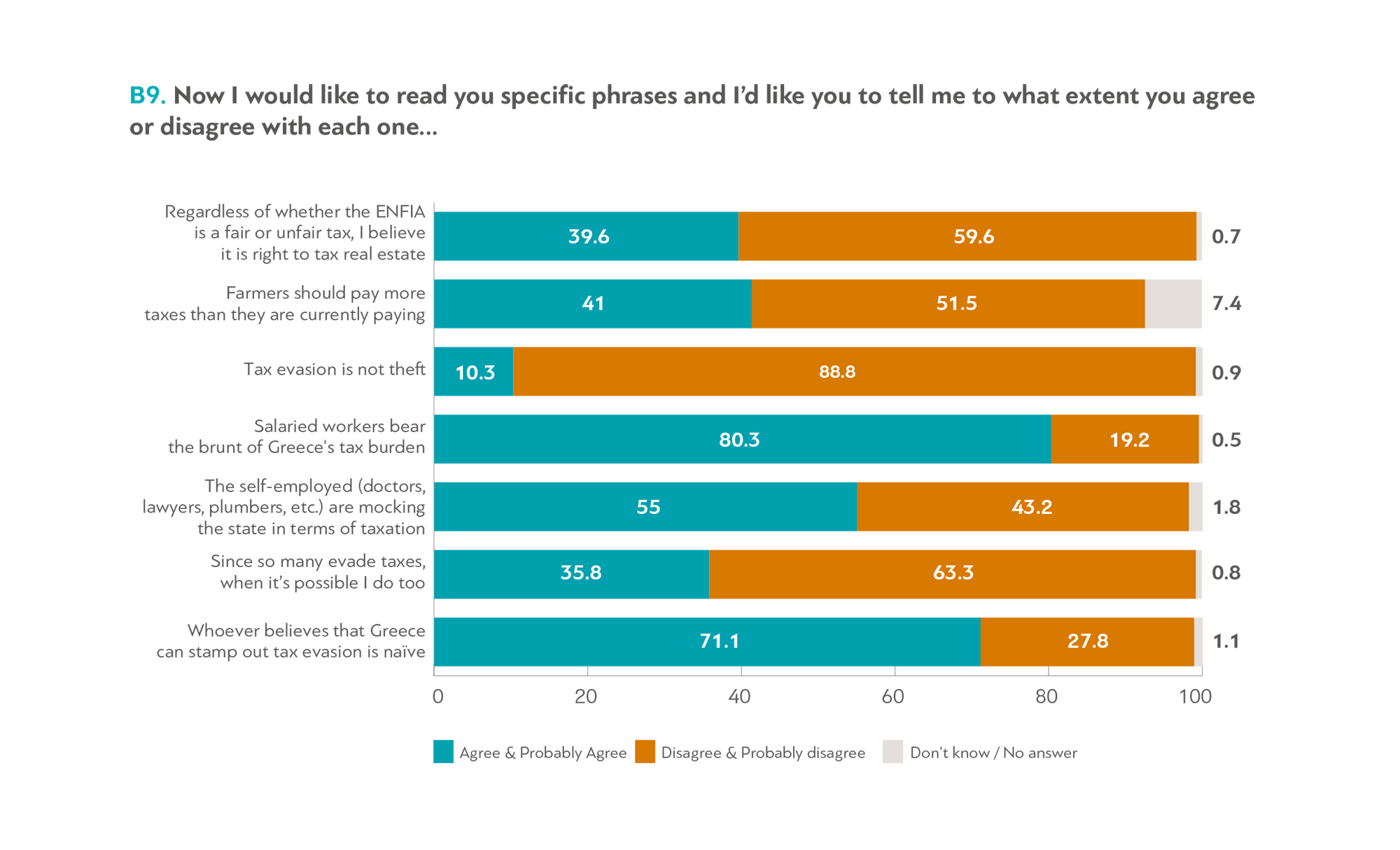
To the most direct question about the role of the state in fostering much-needed development, the answer is even clearer. Only 21.8% believe that "the state should throw money into the market by increasing wages and pensions to increase consumption", while 73.2% believe that the state should "provide incentives to increase investment and exports and to create new jobs". The result extends horizontally across the population, with just a few sectors that responded differently: those who self-identify as far-left, and KKE and ANEL voters. There is no universal acceptance of foreign investment as a vehicle for development. 84.4% of Greeks say they are "in favor of foreign investment in Greece", while 92.1% believe that foreign investments "create jobs". Respondents disagree with the view that "foreign investments do not respect labor rights" (52.4%) and that "foreign investments violate national sovereignty" (58.7%).
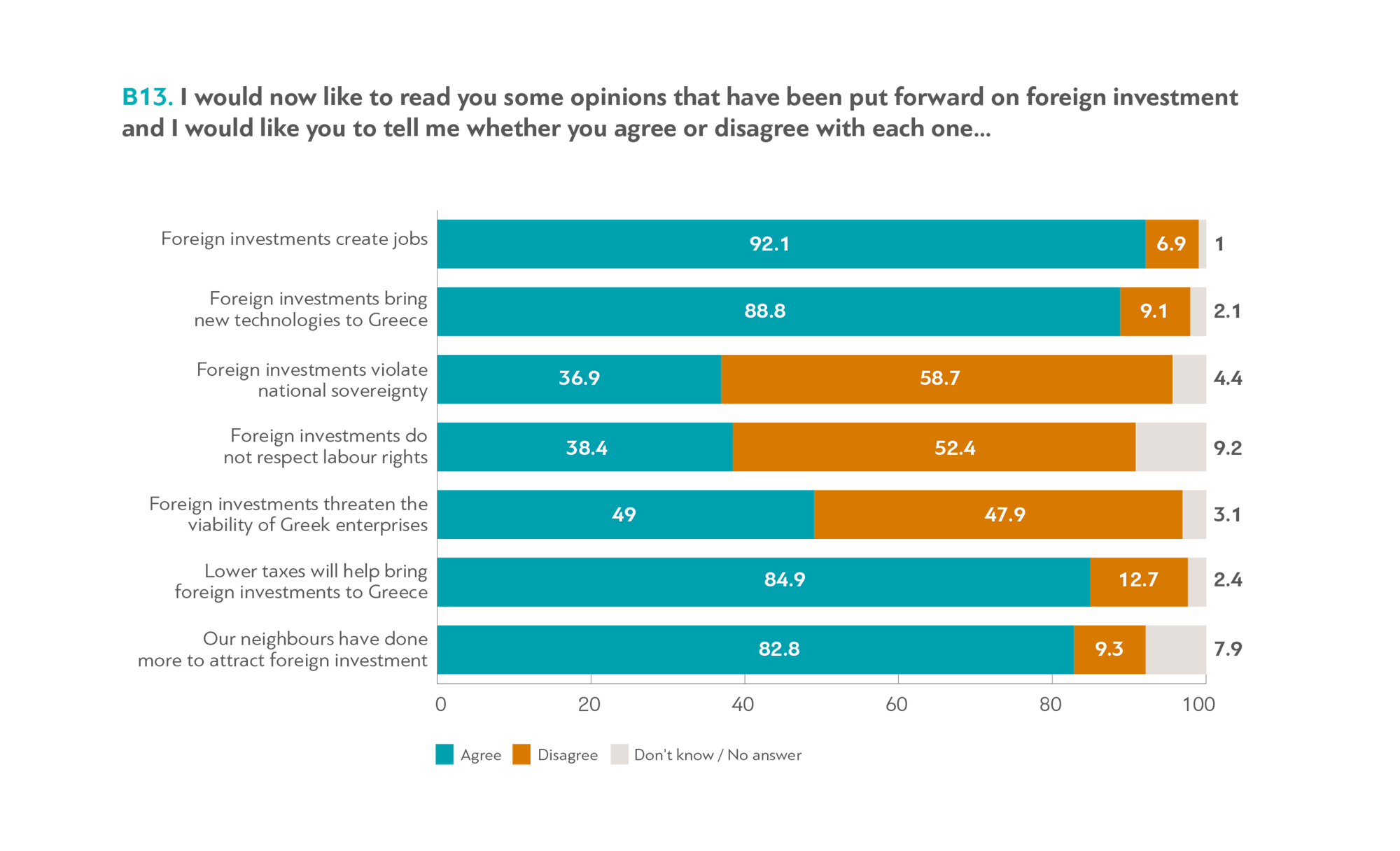
There were a great variety of responses documenting more liberal attitudes towards the state. 7 in 10 believe that priests should be paid from Church resources and not by the Greek government, 52% would choose a private school for their child, if they could, and 6 in 10 agree with the operation of private universities. 62.5% believe that abolition of permanence for civil servants will "improve the quality of services provided by the public sector". 1 in 3 public officials agree with this view.
As mentioned above, only 33.3% of Greeks say they regard "capitalism" positively, while a spectacular 62.1% feel that "socialism" is a good thing. At the same time, however, Greeks have positive associations with "markets" (72.5%), "competitiveness" (87.2%) and "privatization" (56.2) but negative views of "trade unionism" (59%).
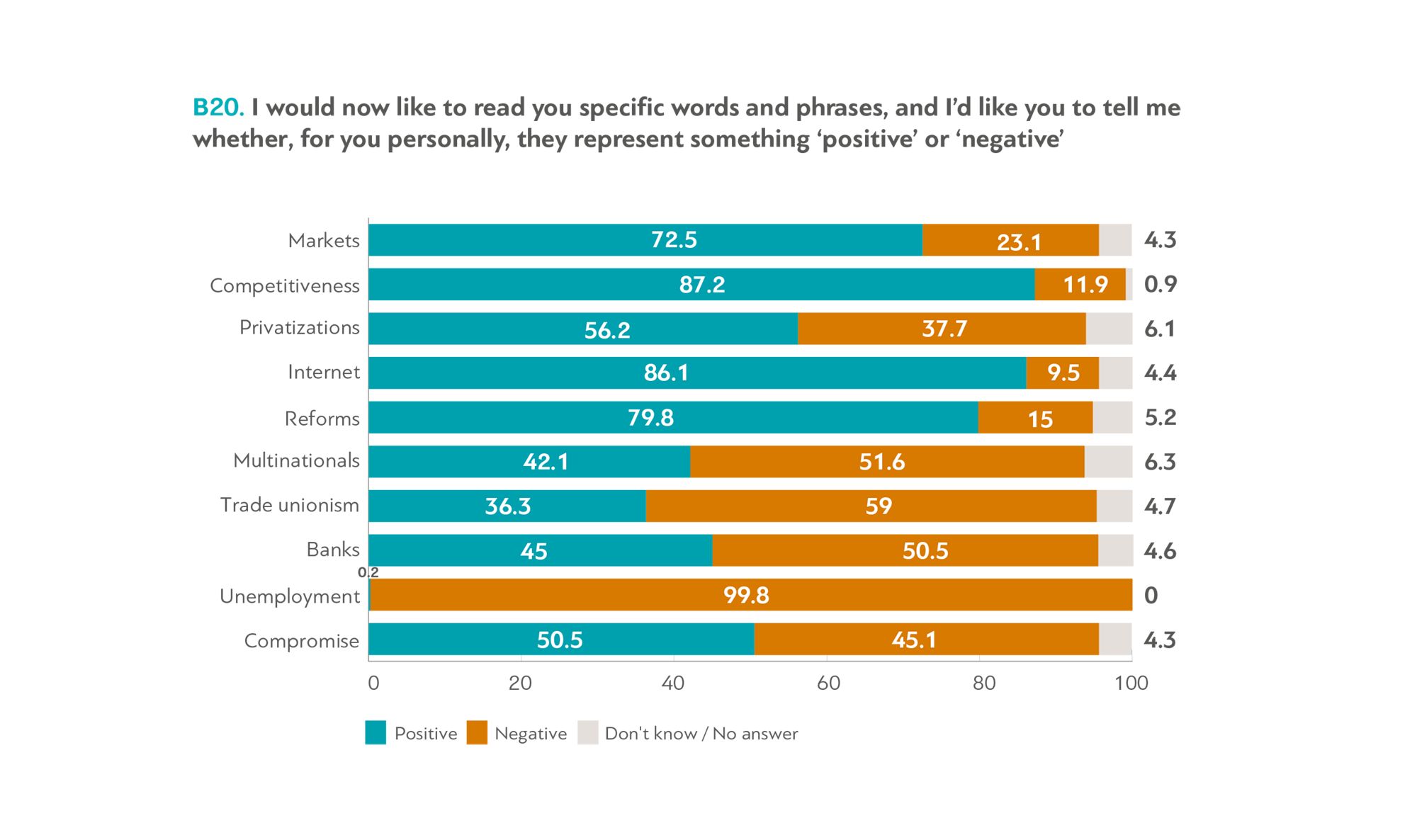
Marantzidis writes, "Many Greeks now firmly believe that the state, after spending decades operating in a wasteful and corrupt manner, extracting wealth from particular segments of the population and sharing undeclared favors wherever their clients pointed, is now killing its citizens with high taxes, now that uncontrolled borrowing opportunities are over. At the basis of this assessment is the public’s conviction that there need to be limits on the state, both at the institutional level as well as at the broader level of interventions in trade and labor."
On the other hand, however, there are contradictions in the economically liberal responses profiles. 6 in 10 Greeks believe that globalization "is a threat to Greece". Greeks continue to show an aversion to risk: 62.3% would prefer a job with ‘modest salary, low prospects for advancement, but stability’ over one with ‘high salary, advancement prospects but without job security.’ At the same time, however, to the direct question "what job would you choose", just 1 in 4 now choose "salaried employment in the public sector". Despite being risk averse, half of Greeks said they would like to be self-employed or entrepreneurs.
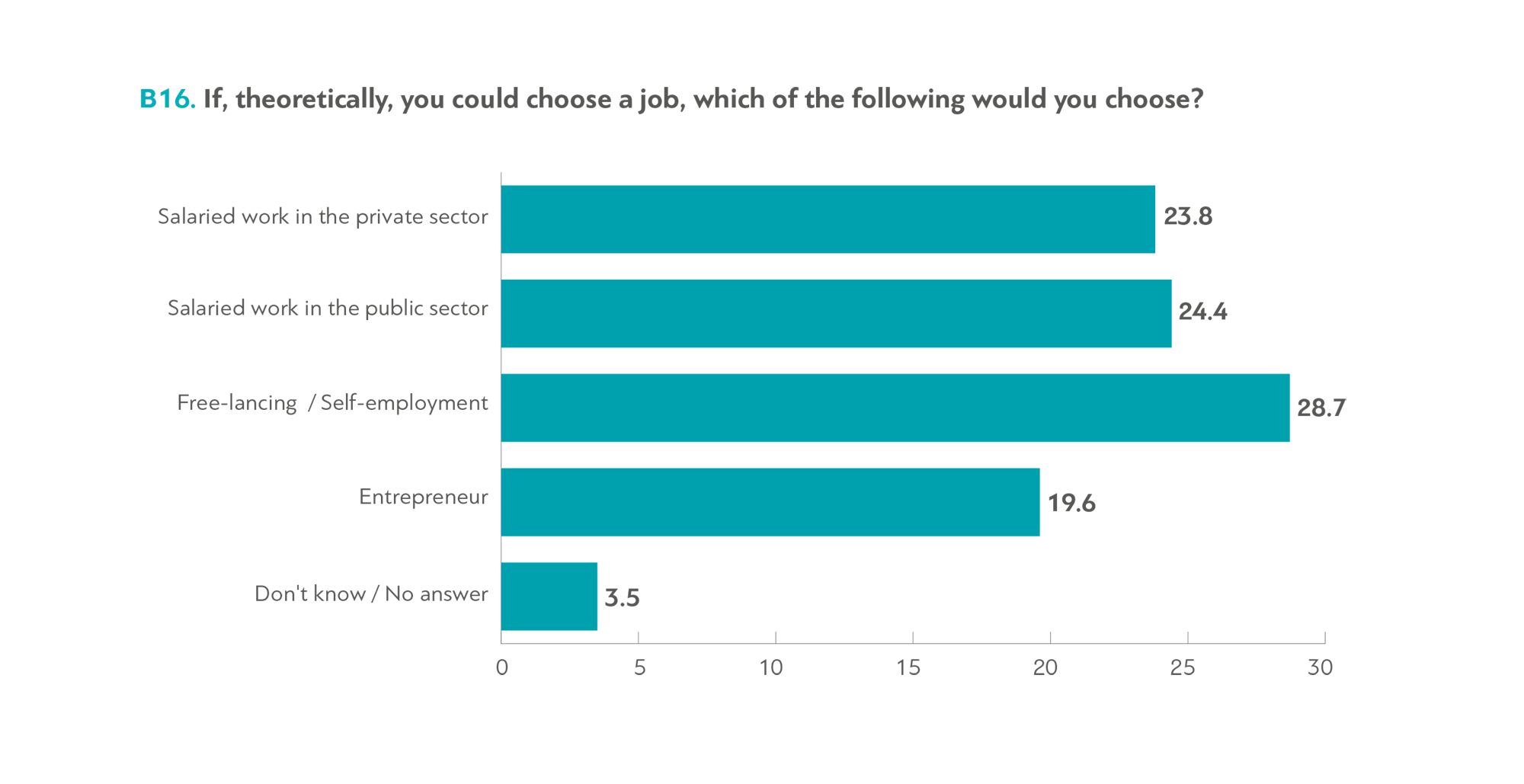
This is possibly connected with the 3 out of 4 who "agree" or "probably agree" that the Greeks "are primarily focused on individual interests, even at the expense of the whole".
Furthermore, the responses to the question about retirement age also blur the anti-state and liberal tinge of most answers to economics-related questions. Half of Greeks believe that 60 should be the maximum retirement age. Just 5.8% of respondents believe that Greeks should draw a pension only after 65.
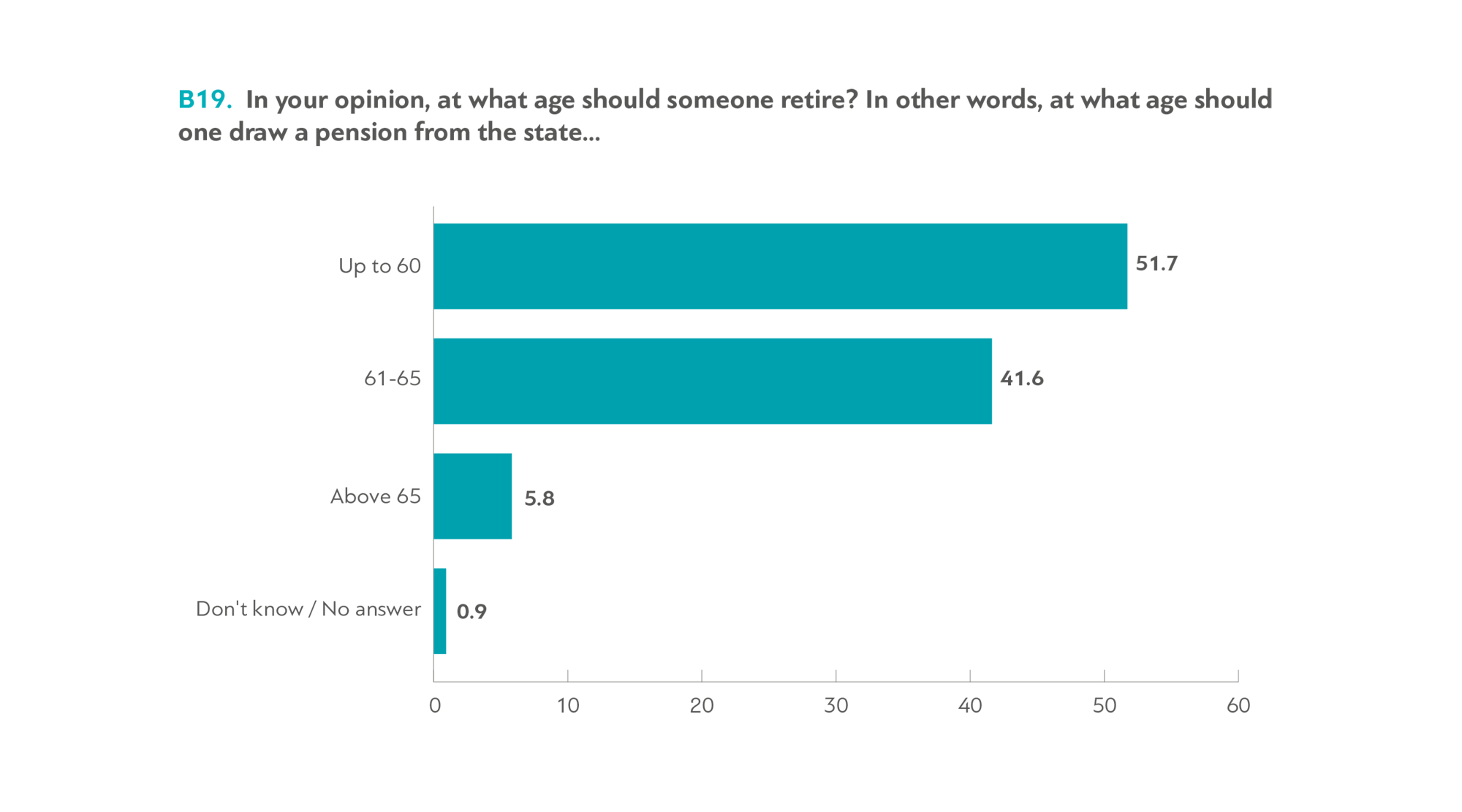
Social conservatism
Last year it became apparent that, as a rule, Greeks appear conservative in their views on social matters, and this is confirmed again this year.
Greeks remain very skeptical towards immigration, although the refugee crisis has somewhat "softened" their views on some issues. 58% believe that the presence of immigrants in the country increases unemployment (from nearly 70% in April 2015) while 64.4% believe that immigrants increase crime (from nearly 75%). Of course, the percentage of Greeks who believe that the presence of immigrants in the country has a positive economic impact, or that they enrich our culture, remains at the same percentages with the previous survey, while fewer than 2 in 10 want legal migrants to stay in the country and integrate into our society.
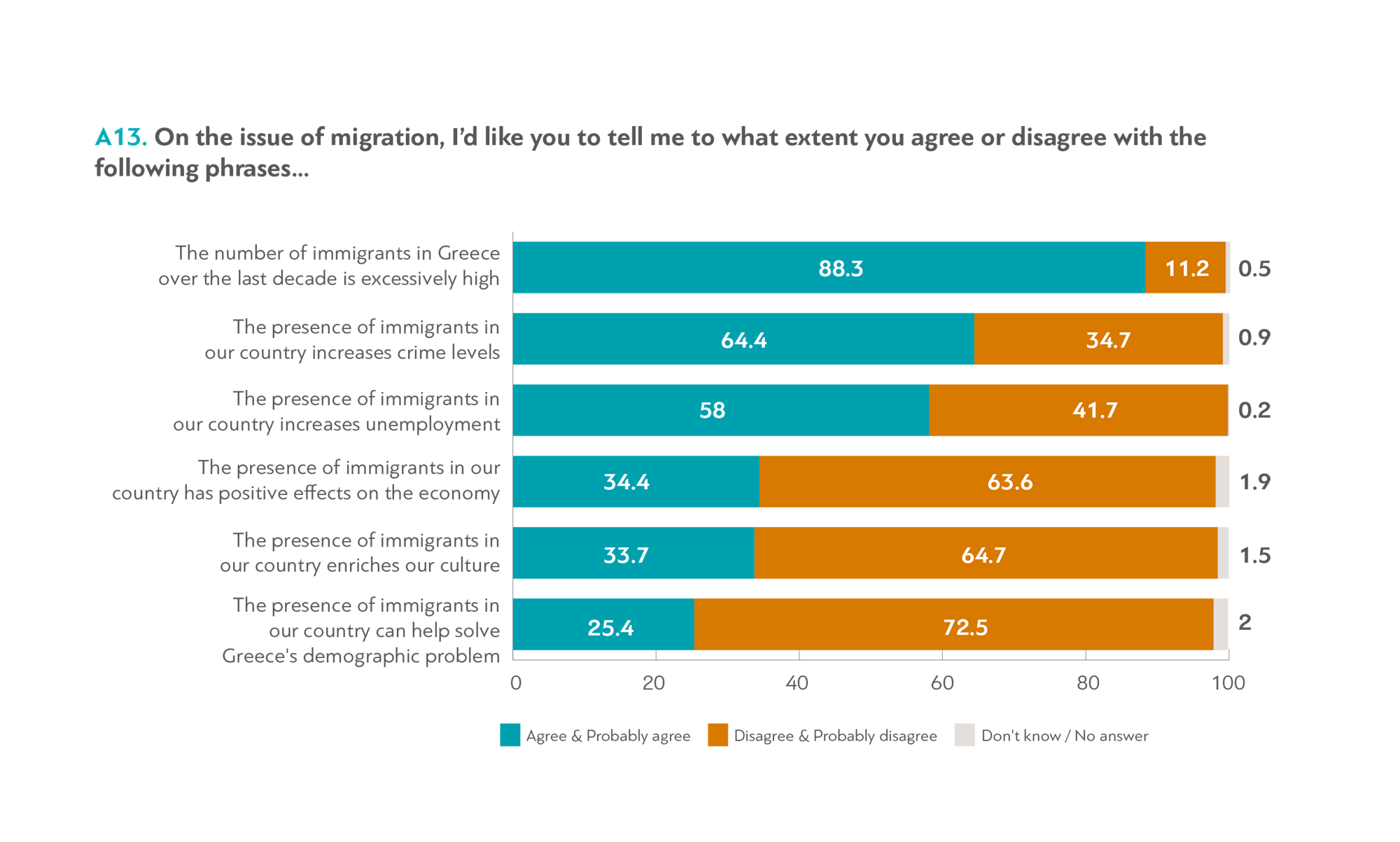
There has been a slight pull back on some issues. 66.5% continue to agree that the children of legal migrants should immediately get Greek citizenship (even those who believe in the "chemtrails" conspiracy theory) – but in April 2015 the percentage was 75.2%. Today, just 37.6% believe that migrants are ‘positive,’ but the corresponding figure for "refugees" reaches 49.3%. 3 in 10 Greeks also believe that ‘many Muslims’ agree with jihadist terrorist attacks. The same percentage believes that such a terrorist attack is likely to happen in Greece in the coming year.
It is also interesting that, decades after the last wave of immigration, the percentage of Greeks that say they would hire "someone of Albanian origin" as an employee remains relatively low, at 60%. In fact, the agricultural sector, the professional category that offered more short term work to immigrants than all others (along with perhaps the building sector), has one of the lowest percentages of positive responses to this question (41.7%). Instead, Greeks would be more willing to hire "a person with special needs" (85.7) or "a homosexual" (77%).
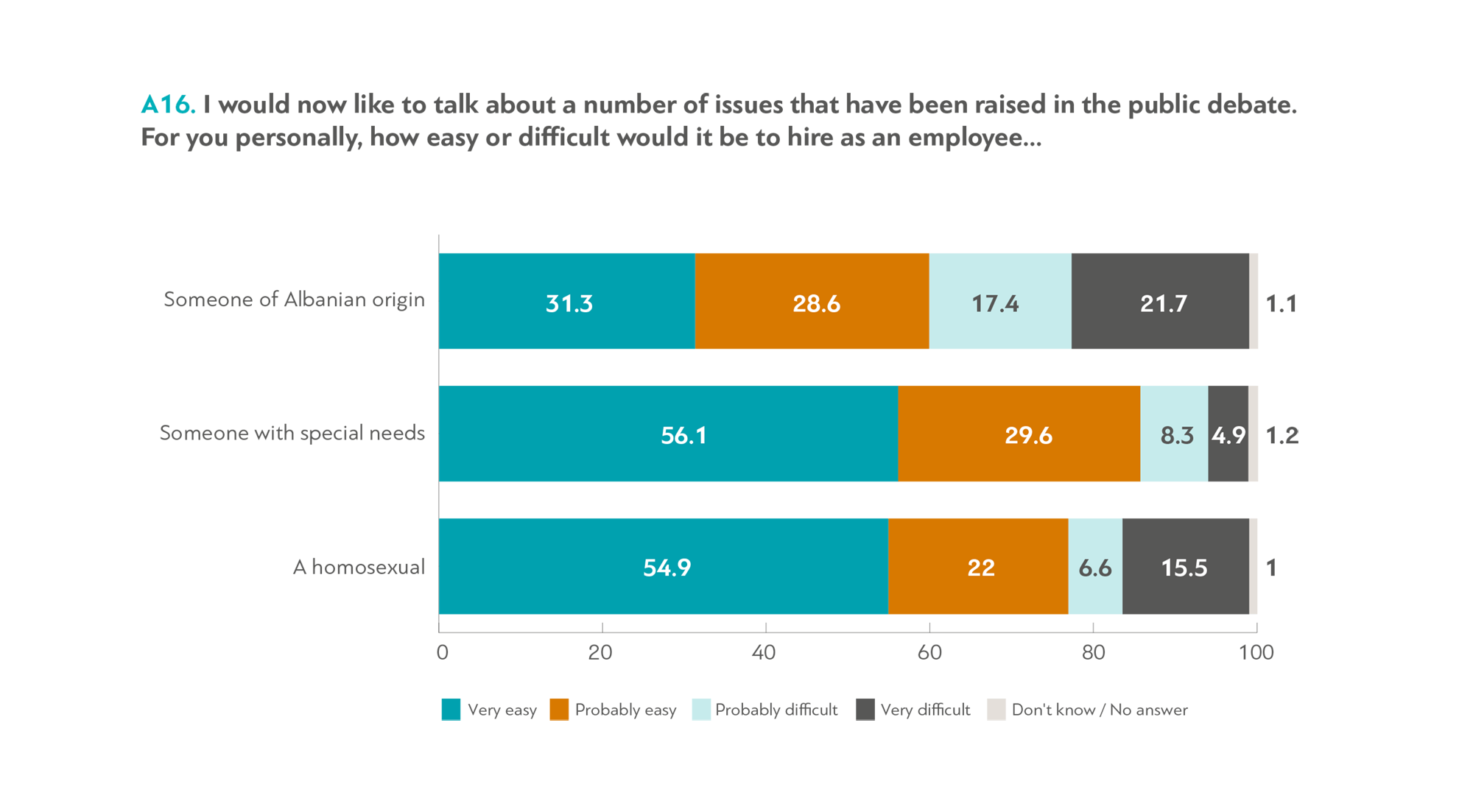
Despite the cautious attitude towards immigration and immigrants, however, there is a very interesting result to the classic question "in your opinion, are you born Greek or do you become Greek?". The public’s responses are divided: 47% choose "you are born Greek", 48% "you become Greek", a rather unexpected result. The young, educated, the wealthy and those left of center of the political spectrum chose ‘become’ in greater percentages. This interesting conclusion is underlined by the fact that, according to most respondents, it is necessary "to adopt Greek customs" for one to be considered "Greek". This option was chosen by most Greeks as characteristic of a "Greek", at a much higher percentage that those who chose "to have Greek parents" or "to be born in Greece".
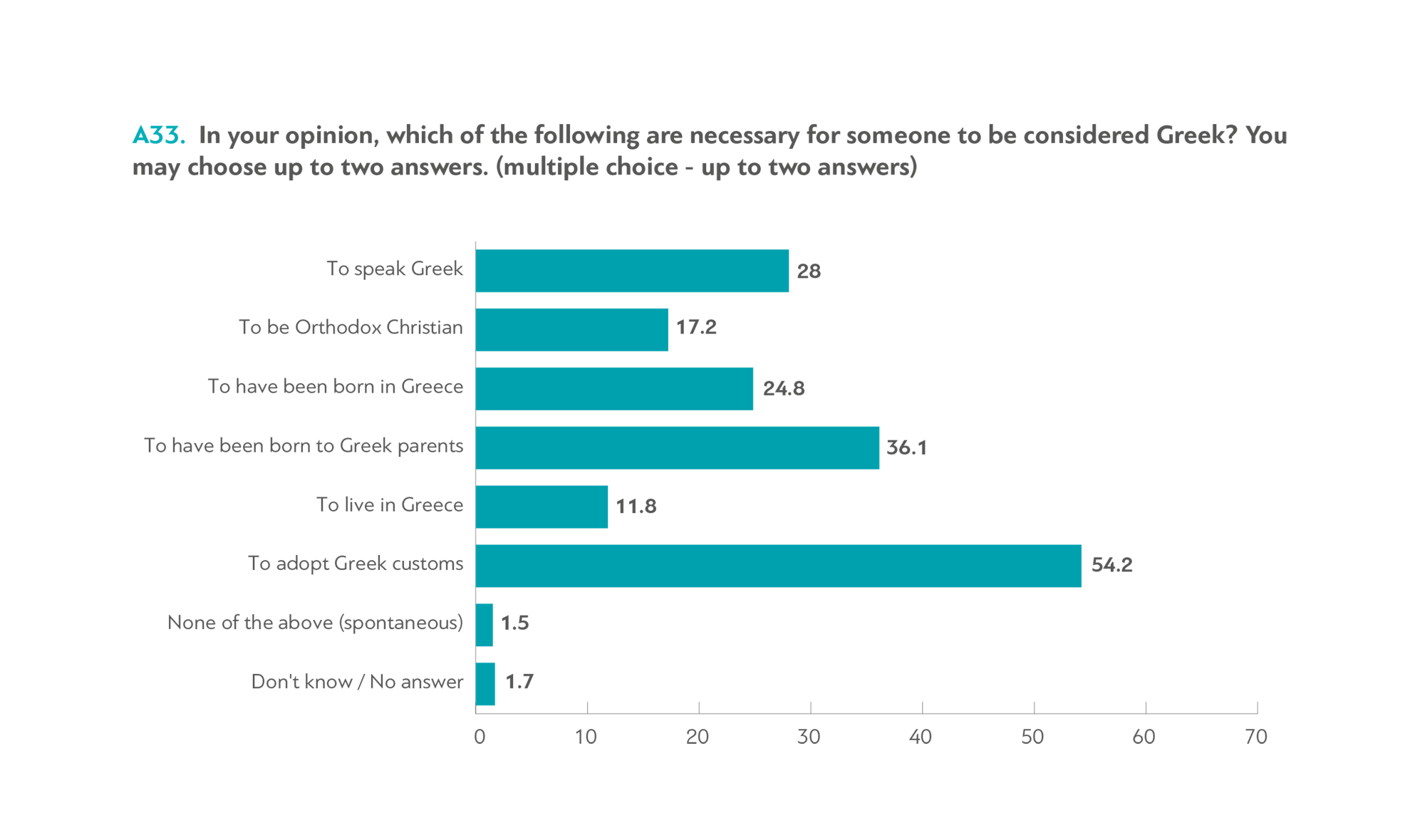
It is also noteworthy that for the second consecutive year there has been a shift in public opinion on gay rights. In the previous survey there was a question on "civil partnerships", an issue that seemed to be widely accepted by Greek public opinion. Then, however, only 36.3% declared that they were in favor of the right for same-sex couples to marry. Since then the civil partnership has been legally extended to cover same-sex couples, that issue has been resolved, but then another change: today, 50.4% of respondents said they are in favor of gay marriage.
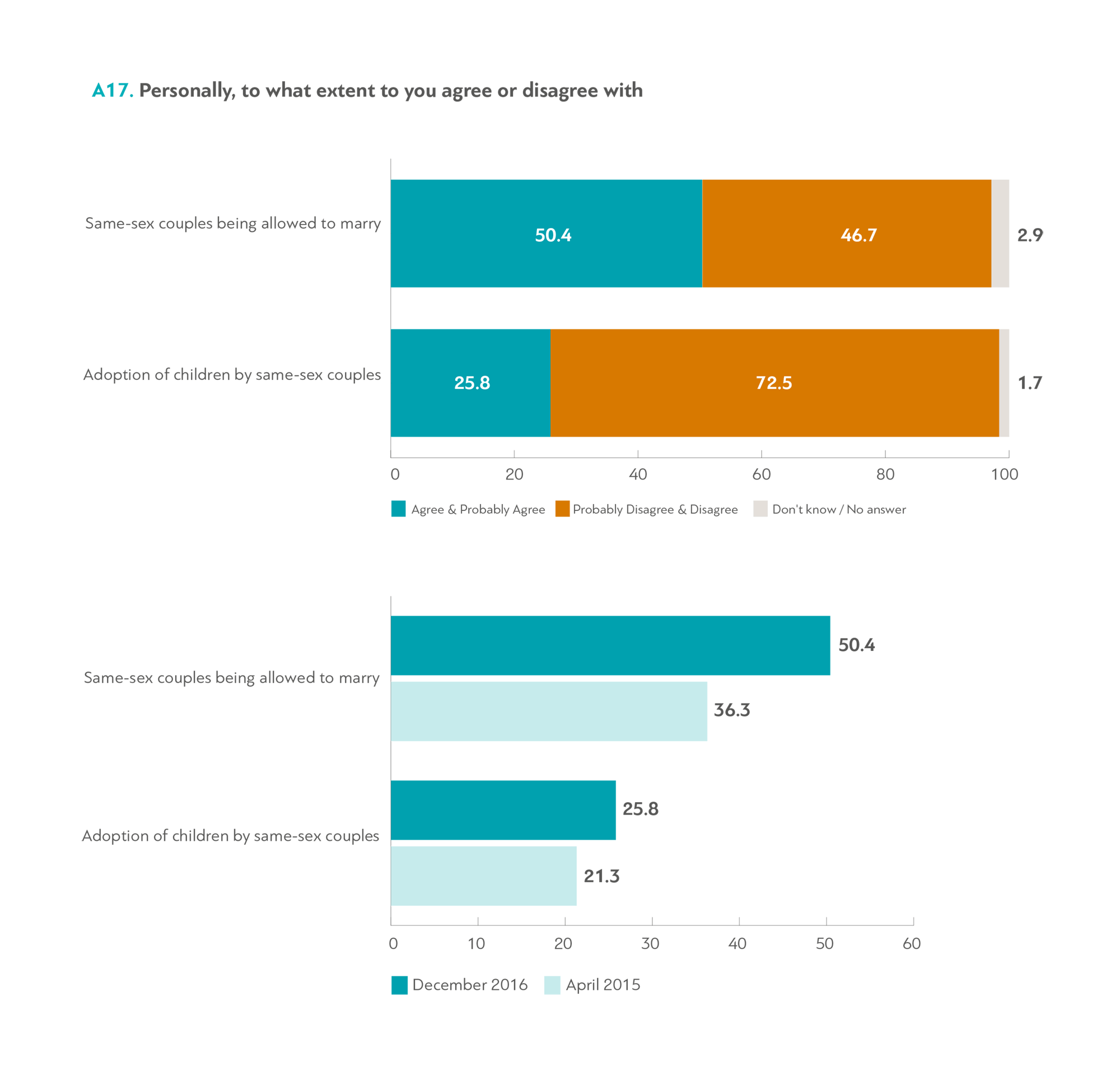
The percentage of those who agree with the right for same-sex couples to adopt children remains low – at 25.8% (from 21.3% in April 2015). However, it is interesting that among young people ages 17-24 the figure reaches 48.6%.
The attitude of young people on these issues is generally interesting and worth commenting on. The young (this year the category includes 17 year olds who now have the right to vote) respond to human rights and migration issues more progressively in percentages up to double the rate of the general population for many of the questions, although on European and economic questions they are generally very close to previous generations (or even more conservative, in some cases).
For example, only 36.3% of the general population reacts positively to the word "Muslim". The corresponding rate among young people ages 17 to 24 is 54.8%. 44.4% of the general population reacts positively to the word "Jews', while among young people the percentage is 63%. In general, this question posed a series of words (mostly nationalities) for evaluation, and young people responded positively at a much higher rate than the general population for all the words, without exception. A higher percentage of young people (76.3%) agree that the children of immigrants born in this country should be immediately granted Greek citizenship, they would hire individuals of Albanian origin or homosexuals at a much higher percentage than the general population, they are the largest percentage in favor of gay marriage (68.6%), agree in the majority that building mosques in Greece wouldn’t bother them (66.1%), a much smaller percentage fears attacks by jihadis in the next year (16.3%), they believe in a greater proportion that "you become Greek" (61.8%), while 35.6% of young people say that "they do not believe in God".
Finally, this year we wanted to open the debate on issues of equality, and we asked citizens to tell us in what professions they believe women do just as well as men, or better. The responses were interesting. The only occupations where respondents believe that men do better are "police officer" (38.3%) and "driver" (38%), with the response "do equally well" are the majority in both cases. Instead, Greeks believe in very high percentages that women do better in retail professions, as teachers and as "secretarial support'. 22% of Greeks believe that a Greek woman would do better in the position of prime minister, while 15.4% believe that she would do worse. It is worth noting here that Greece remains one of the countries with the lowest female participation in the labor force among European Union countries.
 Other conclusions
Other conclusions
As mentioned in the introduction, the survey includes about 200 variables that can be studied in combination in a variety of ways. It holds a great wealth of findings, some of which arise from questions that were not embedded in the ‘main’ categories of ‘European’ or ‘economic’ issues.
One result that obviously many are interested in and which will be much discussed is that 8 out of 10 Greeks believe that "there are secret organizations working behind the scenes and pulling strings'. Another even more noteworthy is that 26.5% of our fellow citizens believe that the trails left by airplanes in the sky is "spray gas" (the "chemtrails" theory). That percentage reaches 48% among those who finished elementary school, 42% among farmers and 76% among those who self-identify as "far right". If we look at the answers of those who answered "they’re spraying us" in the rest of the survey, they answer much more "anti-European" than the general population, and more conservative on immigration and human rights issues. However, the conclusion that comes from these answers is that these people don’t live in another world. Their answers are not so different from the majority that they are a completely separate category. If anything, they underline the intense dividing line that appears critical in many of the questions: education level.
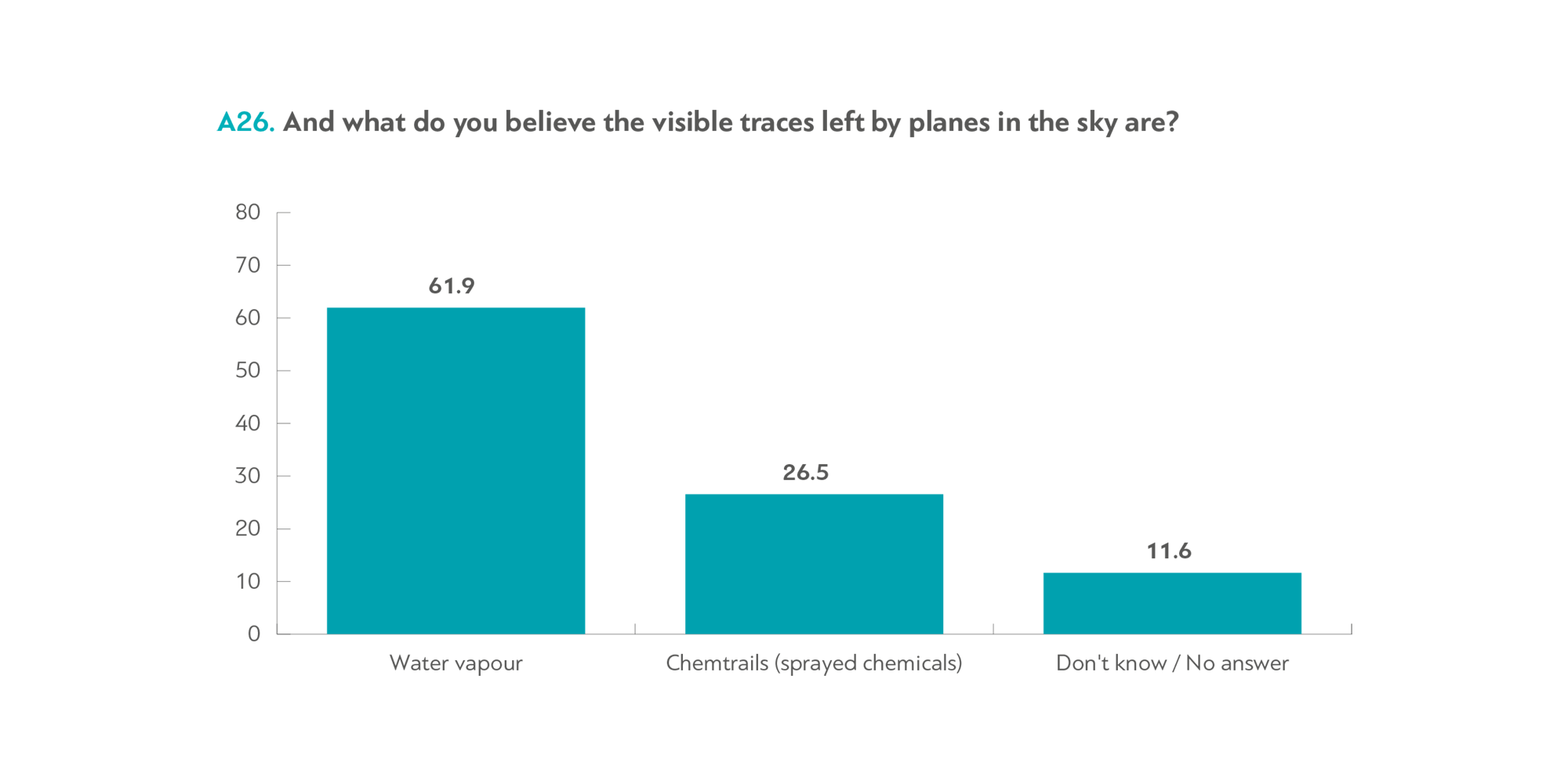
Other notable findings include:
An impressive 33% of Greeks say that they have lived abroad. 15% of the general population has lived abroad for more than two years. We studied how these groups responded to all the questions in the survey. There were notable differences in some questions. For example, 66.2% of Greeks who have lived abroad for more than 10 years believe that overall Greece’s EU membership is positive, while the corresponding percentage among those who have not lived outside of Greece is 55%. They are in favor of same-sex marriage at a higher percentage, anticipate possible jihadi attacks in the next year in larger percentages, and they believe capitalism is ‘good’ in higher percentages. However, in the vast majority of questions, from opinions on remaining in the Euro to estimates about the future of Greece in the EU, no appreciable differences appeared. It is interesting that those who have lived abroad have negative perceptions of "migrants" in similar percentages with those who have never lived abroad.
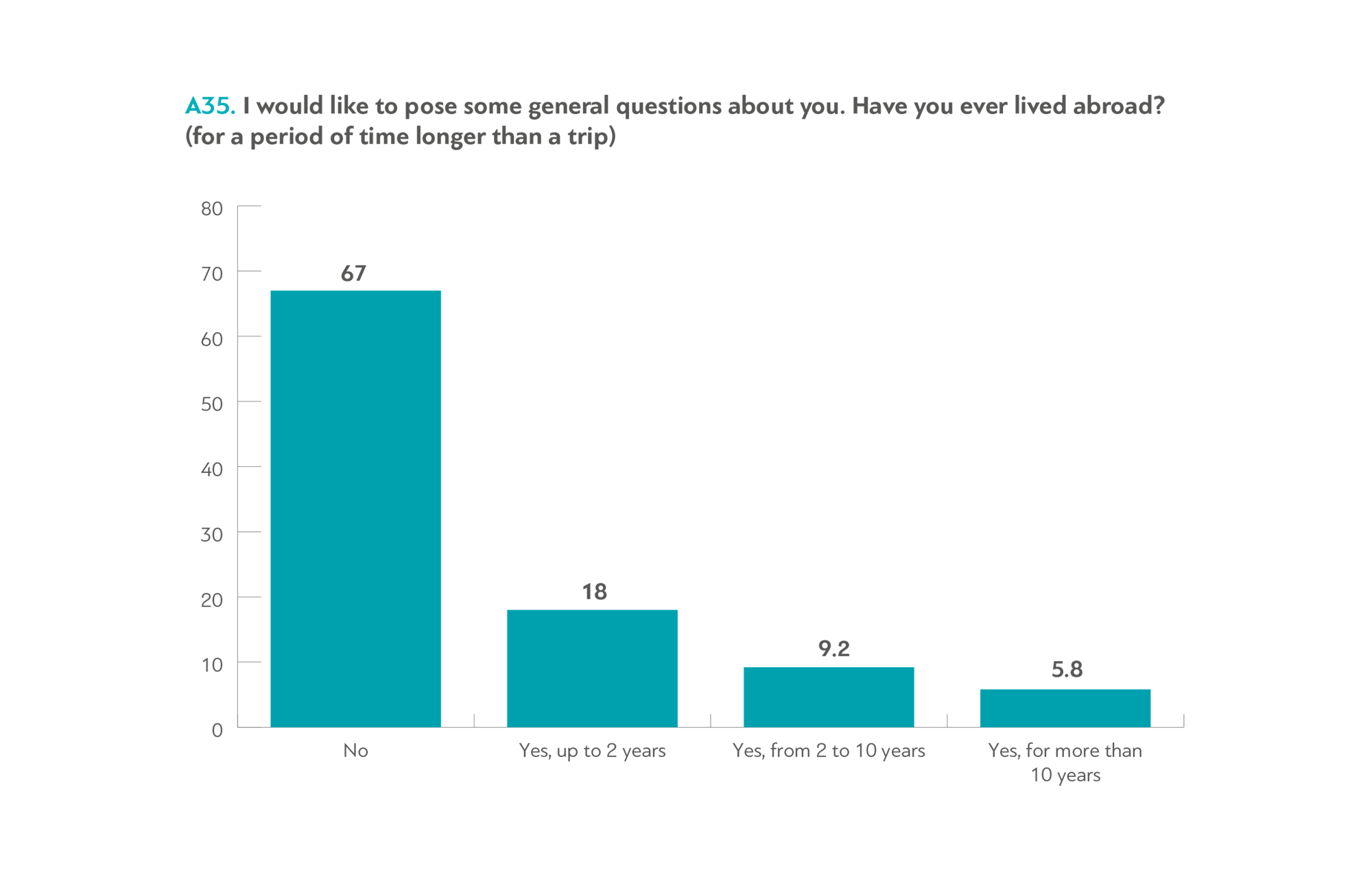
For the first time, 53% of Greeks say they mainly get their news from the internet (with another 3.3% who say "social media/blogs"). Only 1 in 4 says that their main source of information is the television. The division here – and it’s very intense – is education level. 71% of those who hold a postgraduate or doctoral degree are informed primarily by the internet – the corresponding percentage for those who have finished elementary school is just 10%. We studied how they answered all the questions according to the media they choose and the results, a summary of which you can read here, were very interesting.
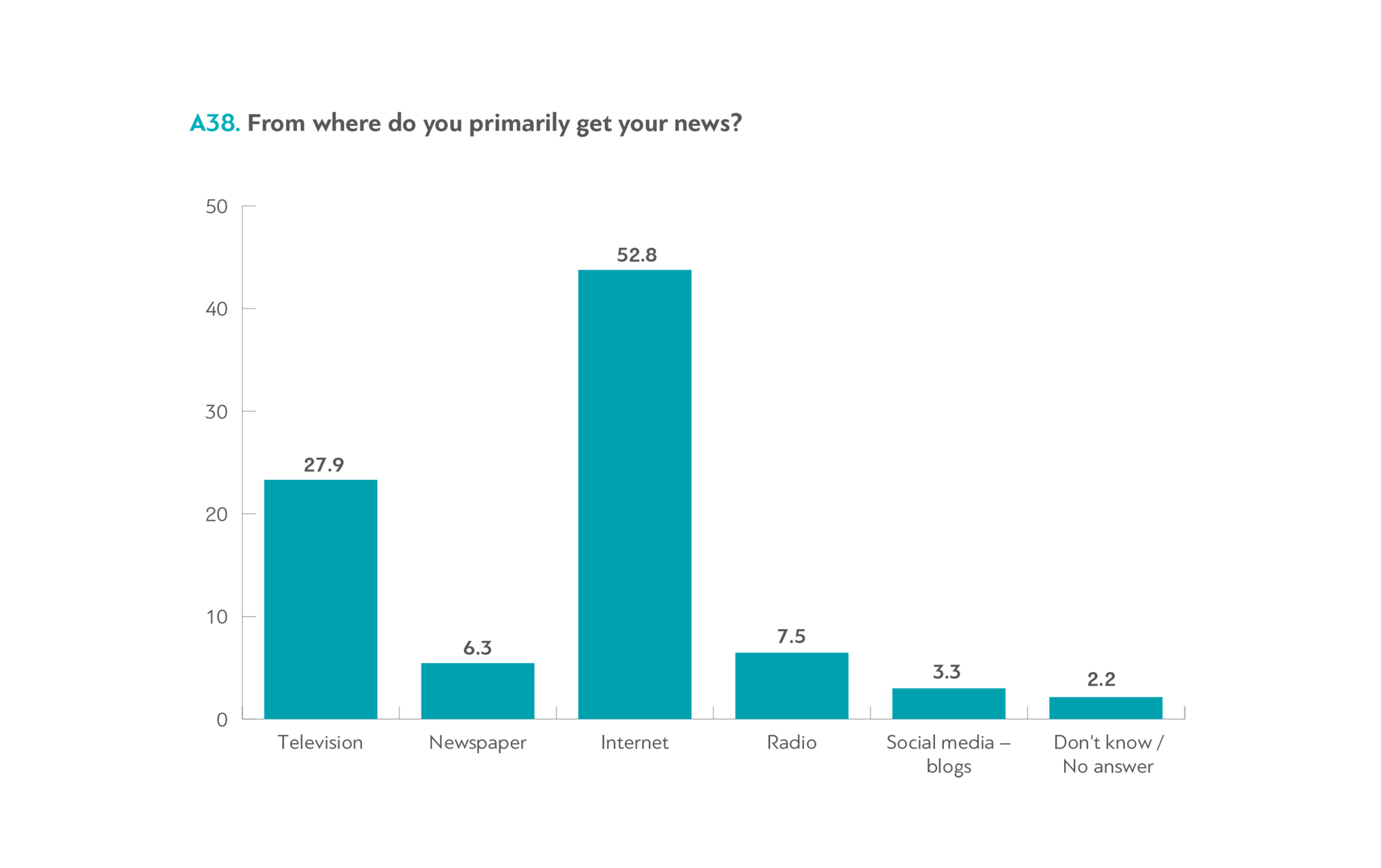
In the last year, one in five Greeks admits he did not read a single book, half of Greeks did not go to the theater once, and the same percentage did not go to a single concert, while 4 in 10 did not go to a museum. One in five Greeks does not exercise at all – nearly one in five exercises "every day".
What is the final conclusion that can be drawn from such a large and complex survey? A general statement, which has to do with this kind of survey in general. How do citizens respond to these kinds of studies? How do they face a stranger who poses difficult, sometimes complicated questions, on the phone? To properly evaluate the results summarized above, which you can explore further here, we must bear in mind two important things, which in no way weaken their meaning or truth, but they offer a good filter for accurate evaluation. First, most of us do not have all the questions on all matters concerning our lives and our world answered in our minds. Therefore, any inconsistencies are expected and justified. We saw above that almost 1 in 10 Greeks believe that the EU will dissolve, while at same time they believe in the next ten years Greece will still be an EU member. This is not ignorance, error or naiveté. Such inconsistencies are expected when someone doesn’t have all the answers ready, and is thinking of them for the first time during a phone call. The second, which directly relates to the first, is that the title of the second survey is inevitably partly misleading. We can ask specific questions and receive specific, clear answers, but that doesn’t mean that these answers reveal exactly "What Greeks Believe". These answers are definitely "what Greeks say they believe" and sometimes represent "What Greeks think they believe". But there is some distance between these two and what Greeks really believe, and it is difficult to calculate with a simple, scientific survey. This job requires careful analysis of the results, through the necessary filters discussed above.
That’s what we’ll try to do next.
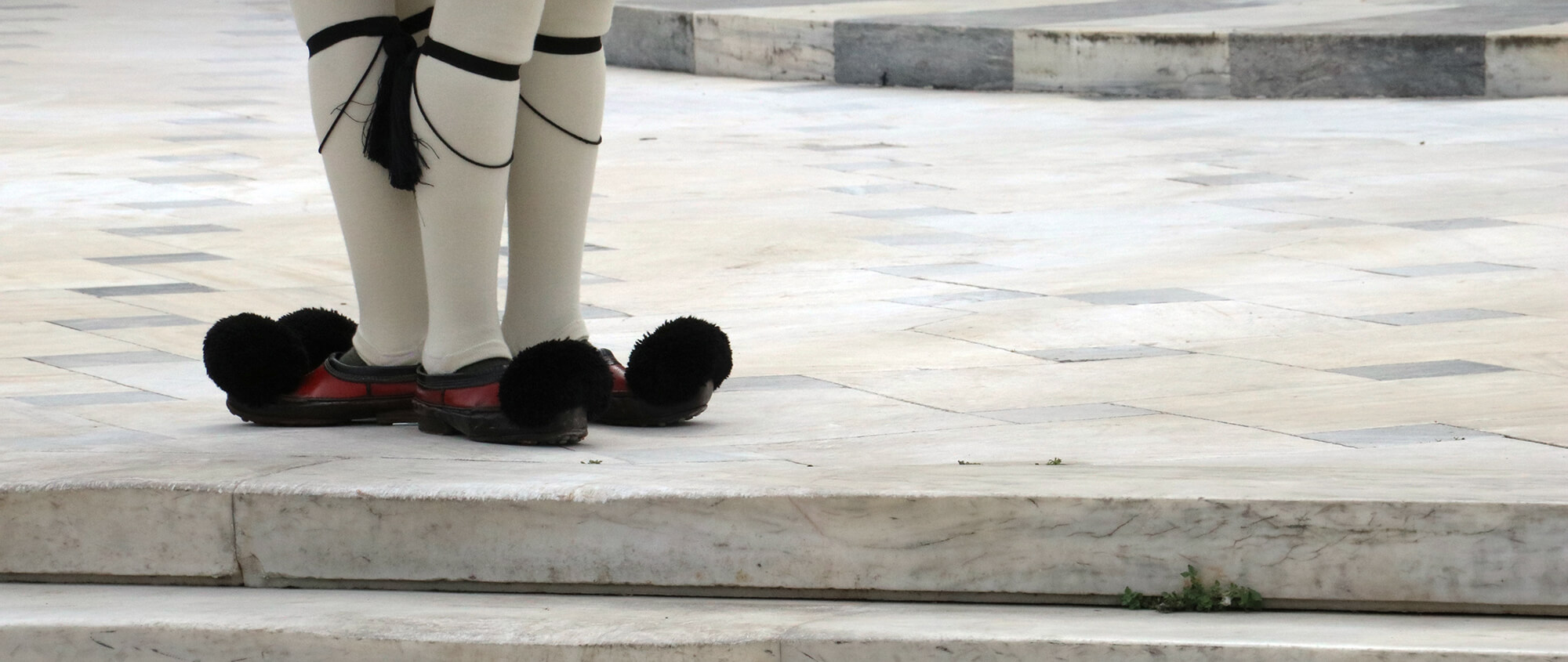
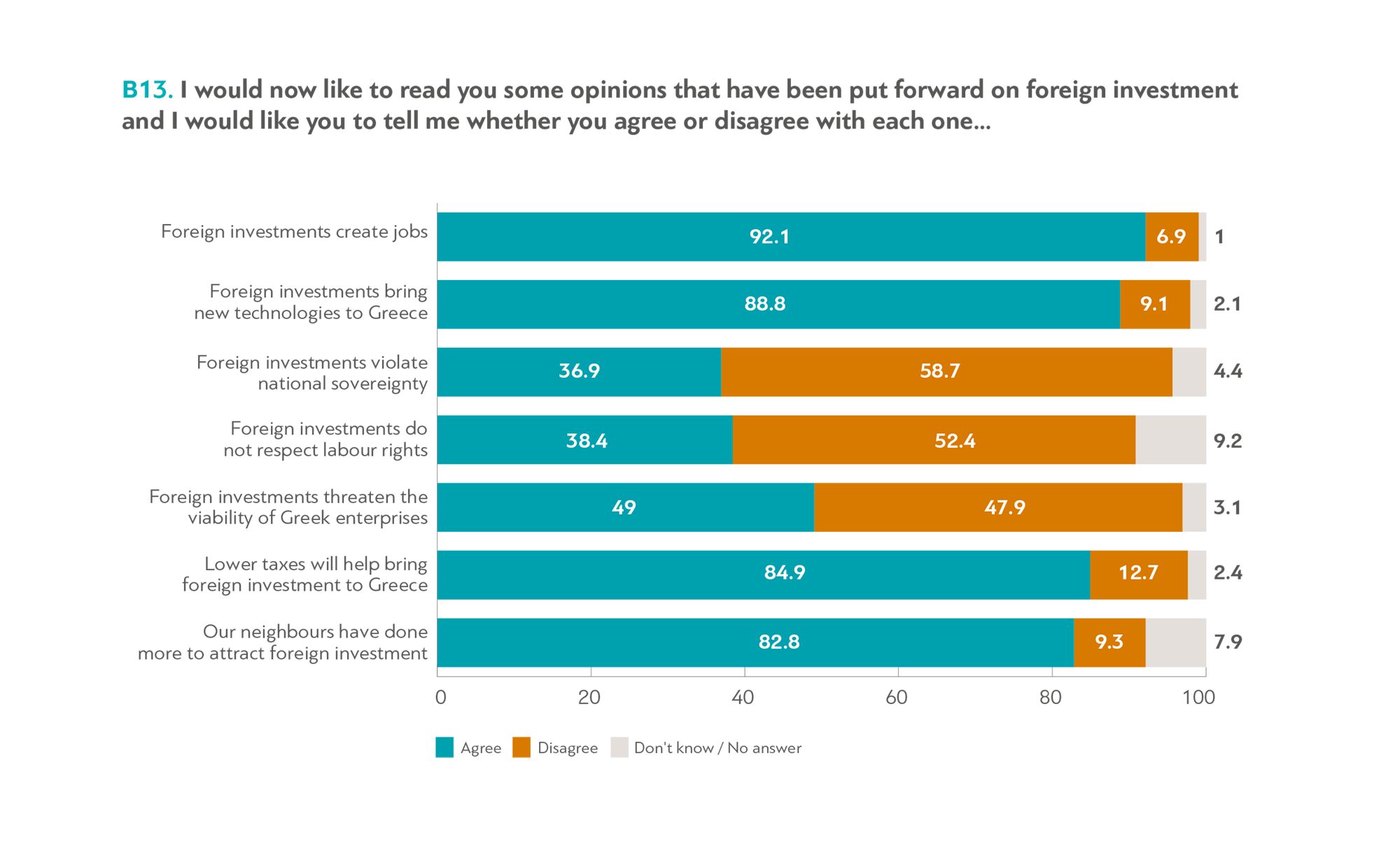 Other conclusions
Other conclusions